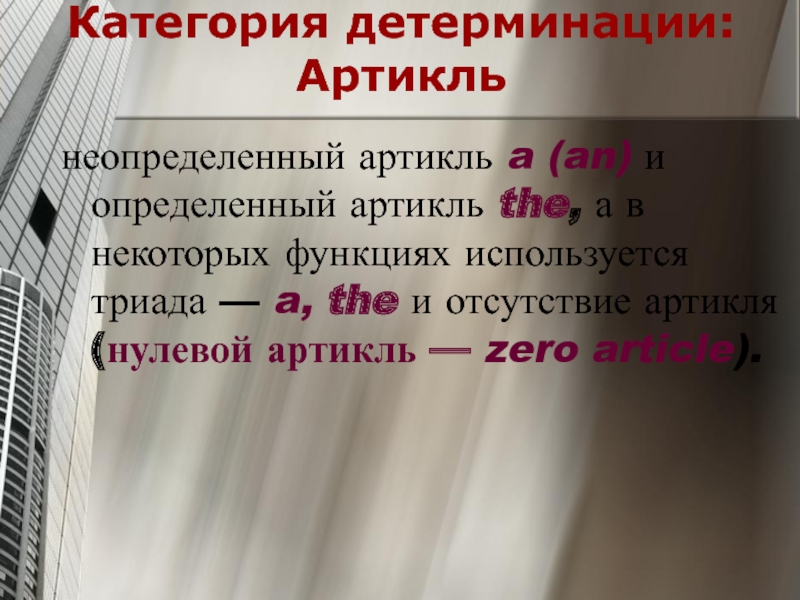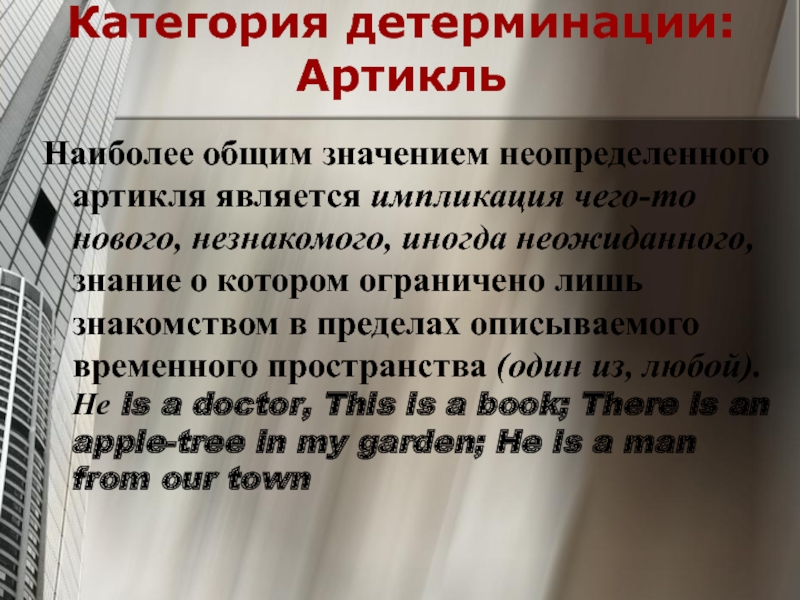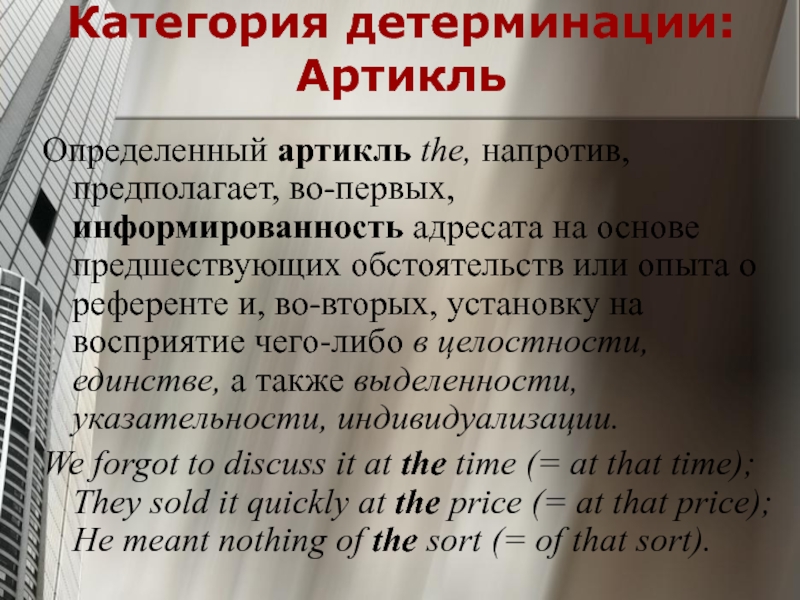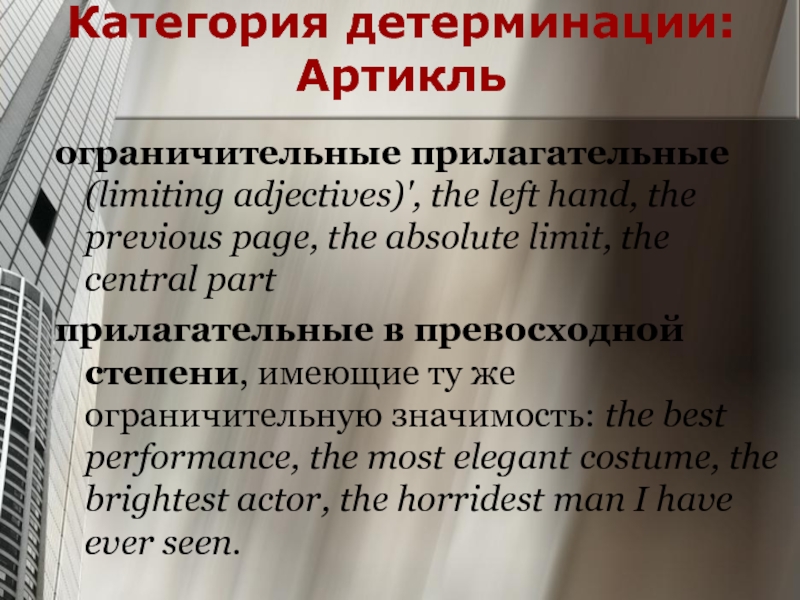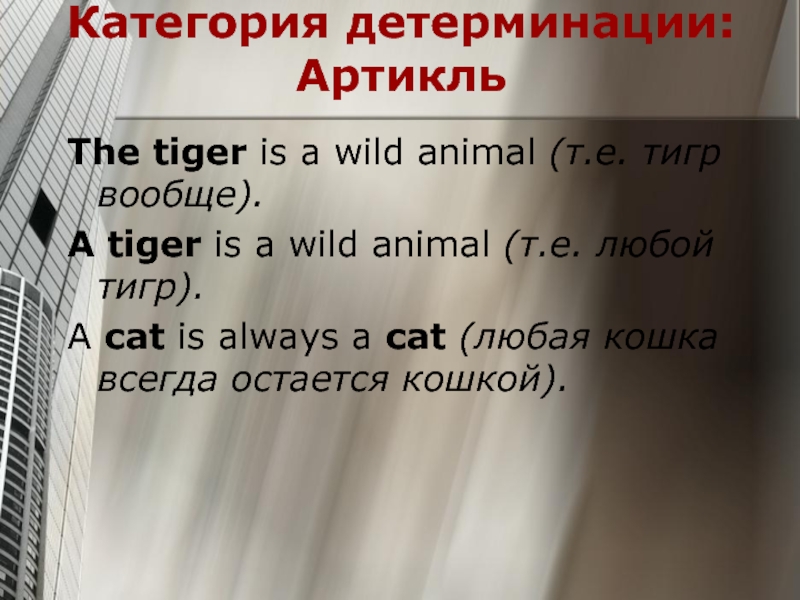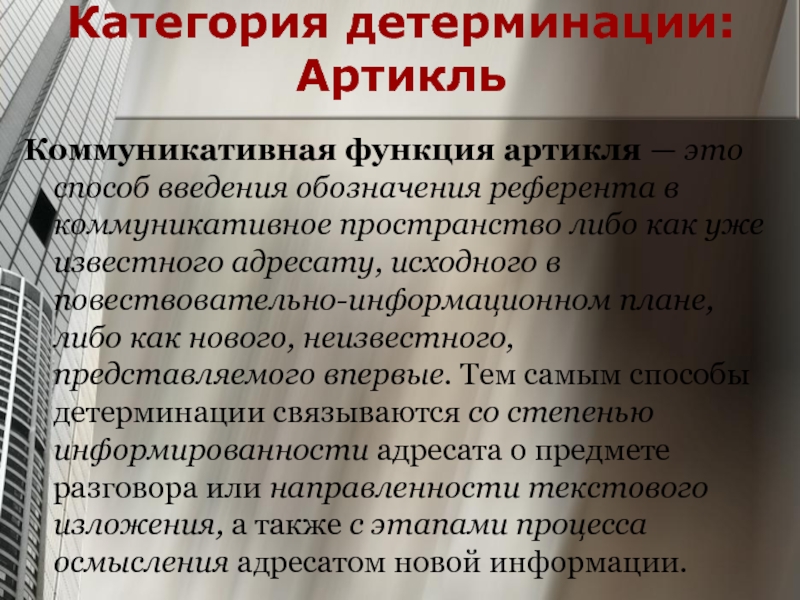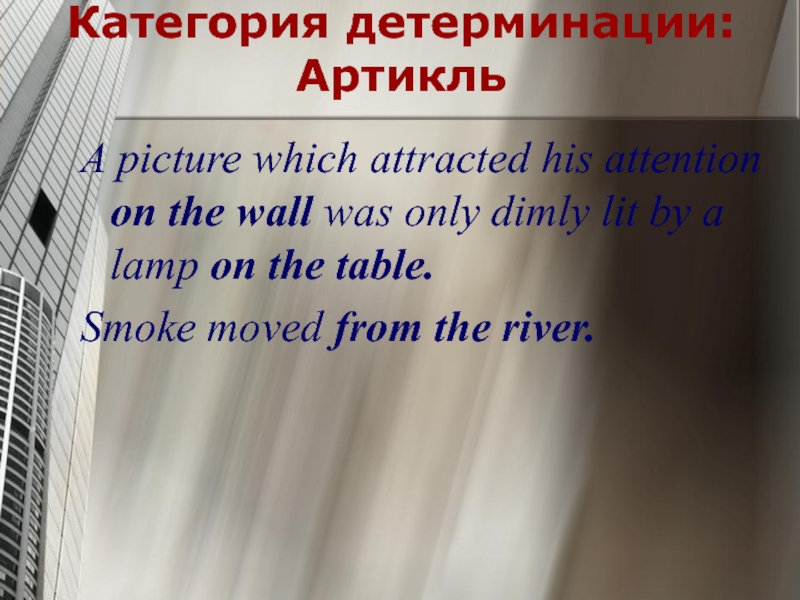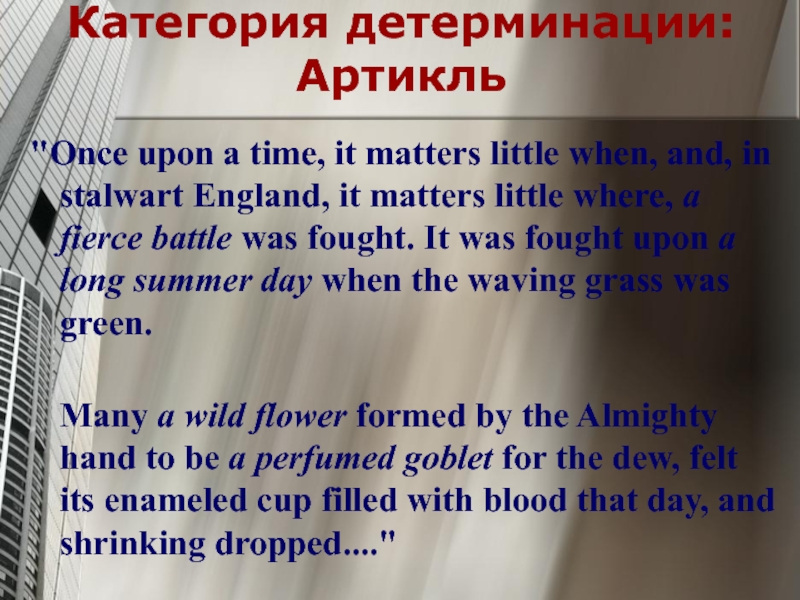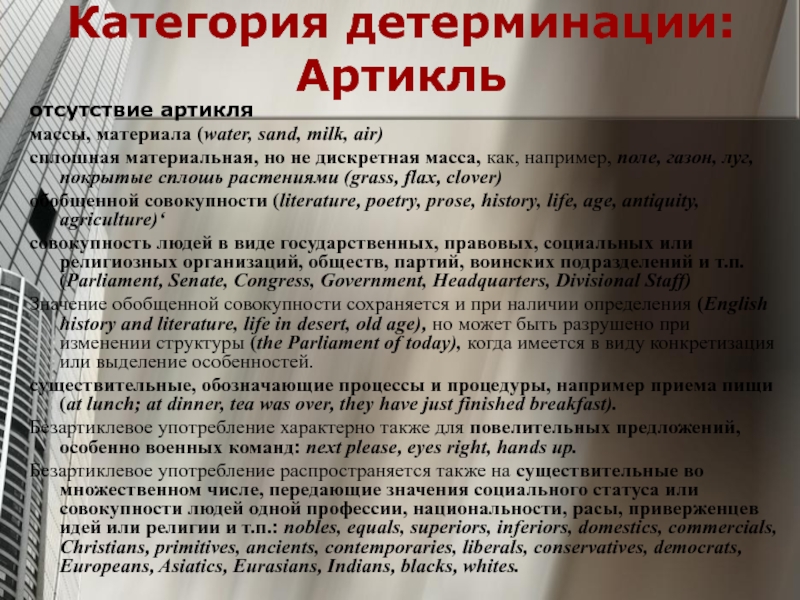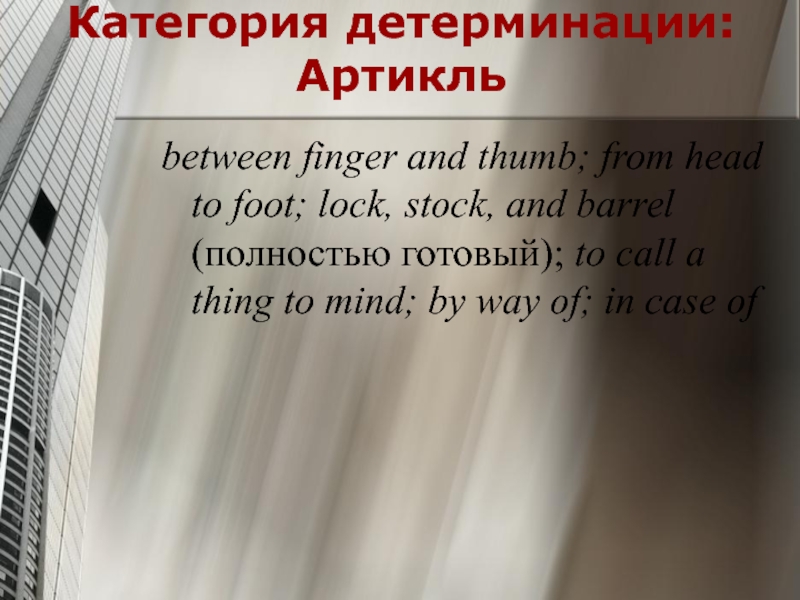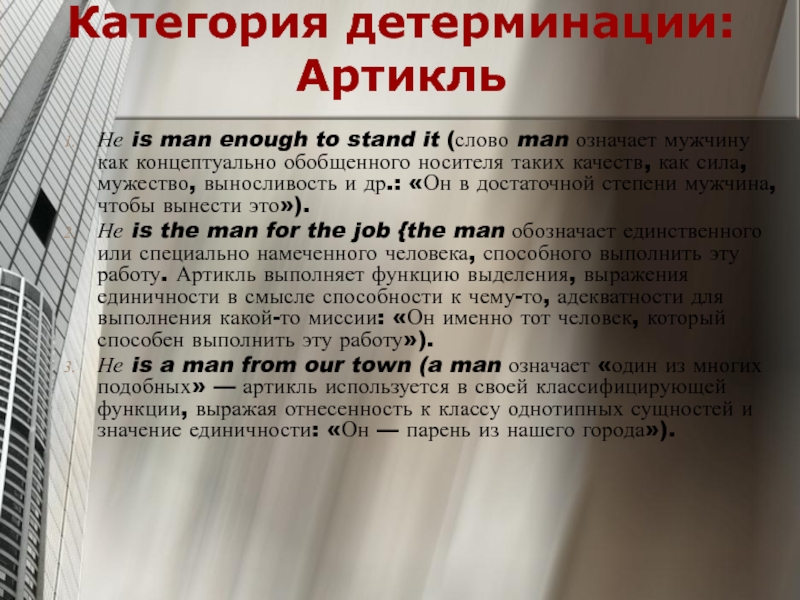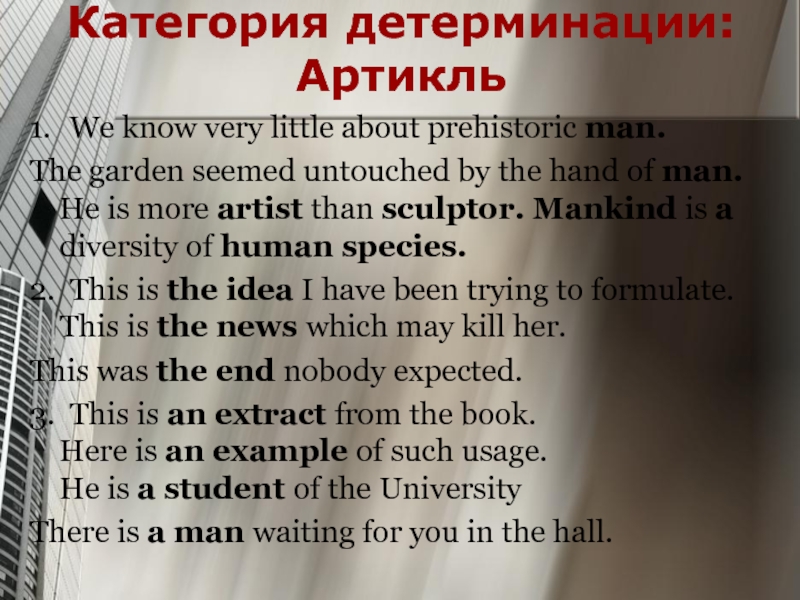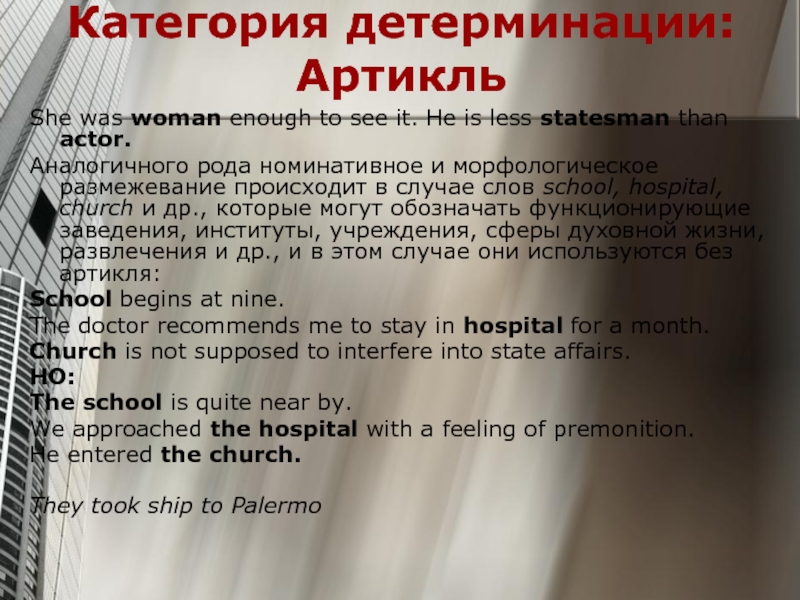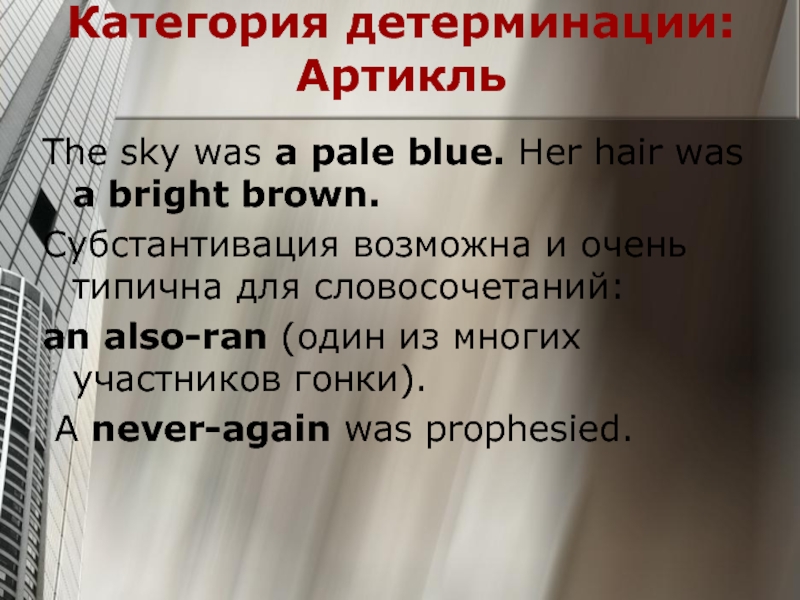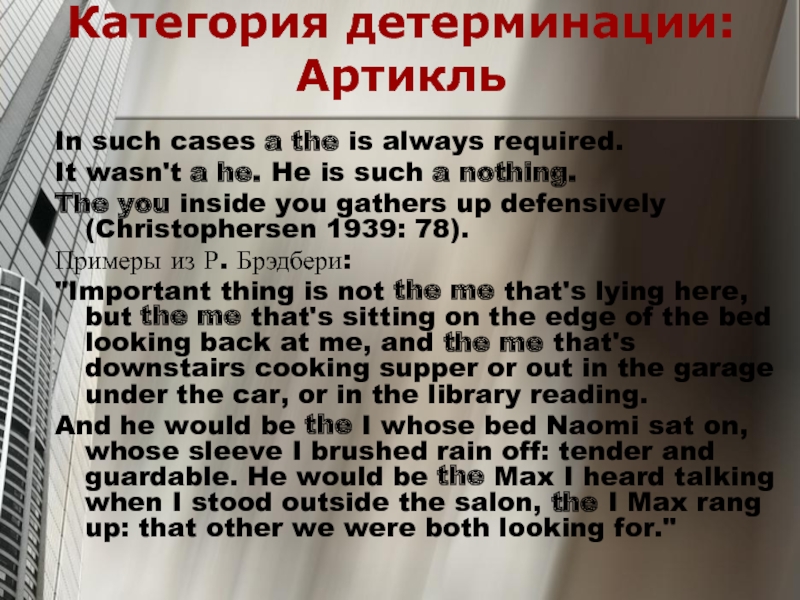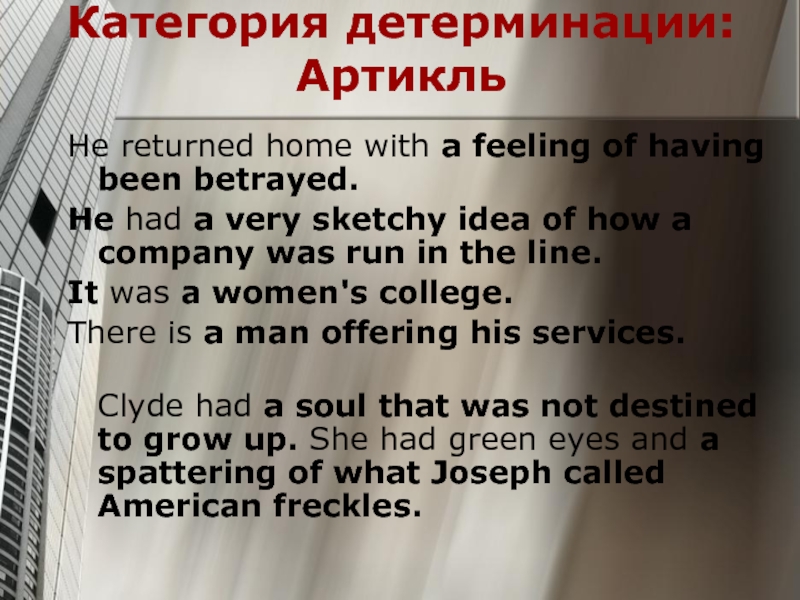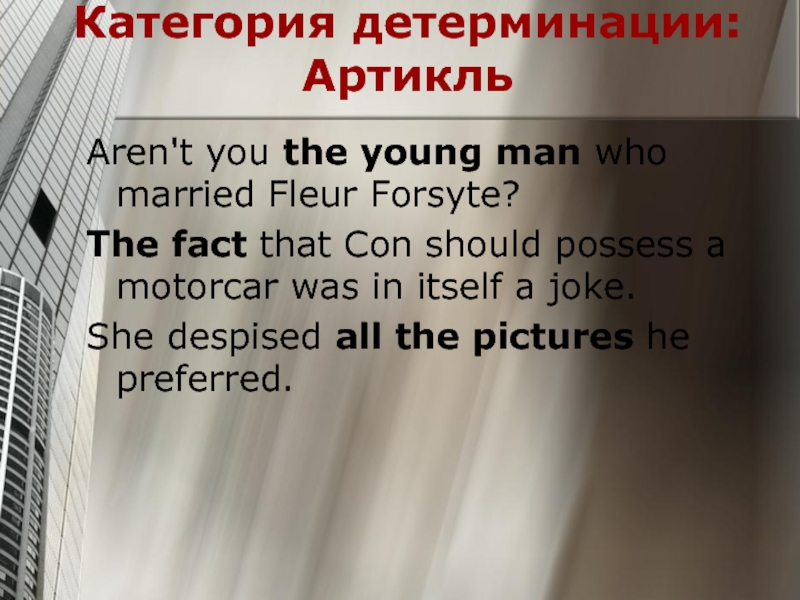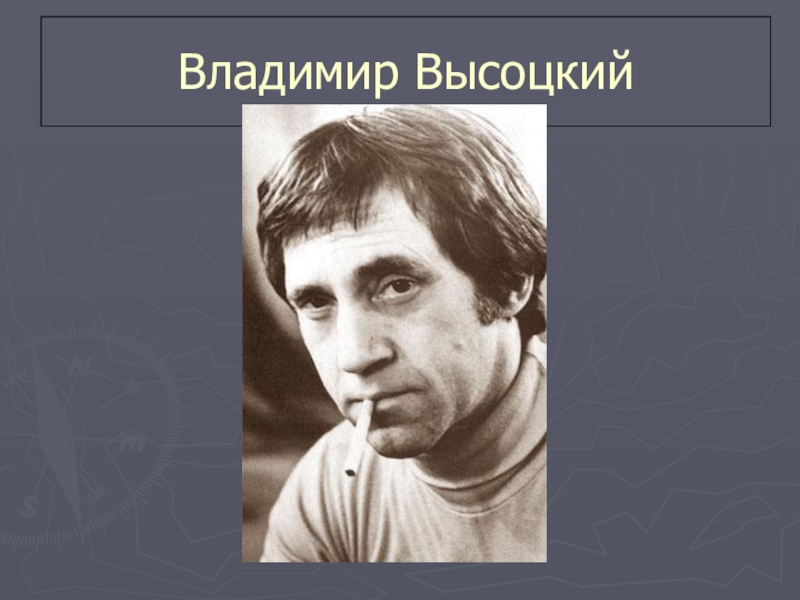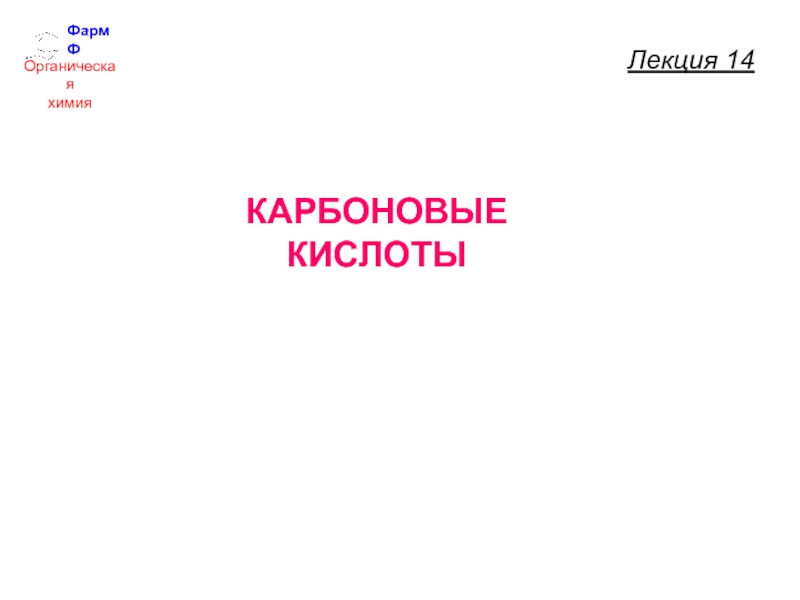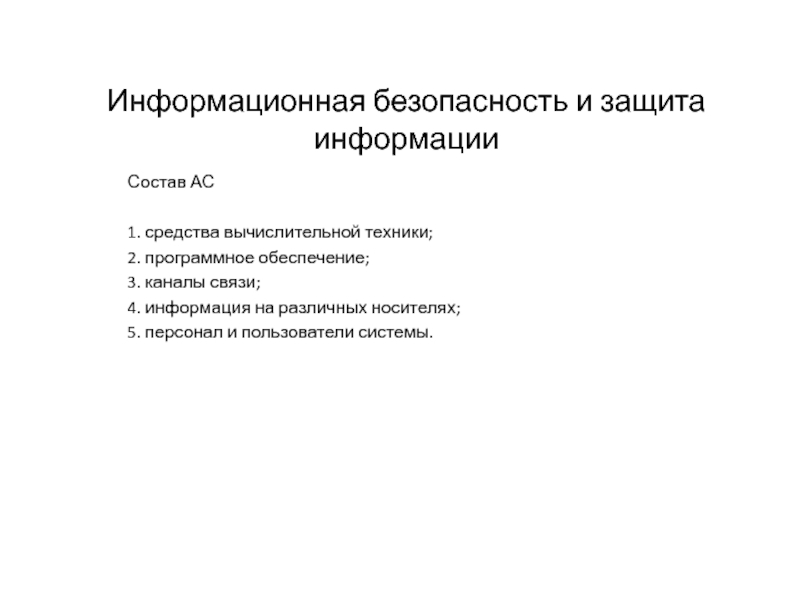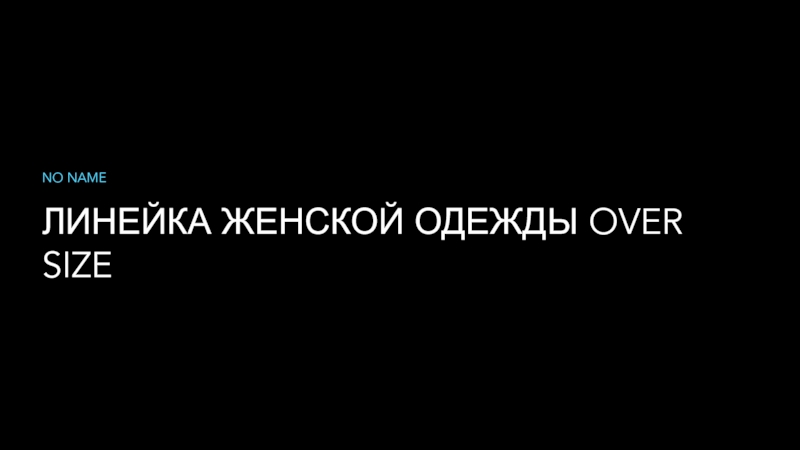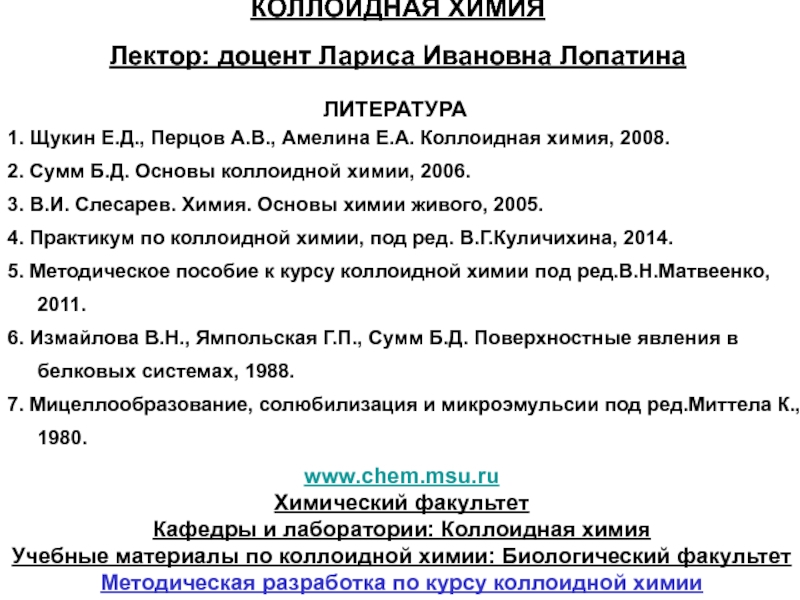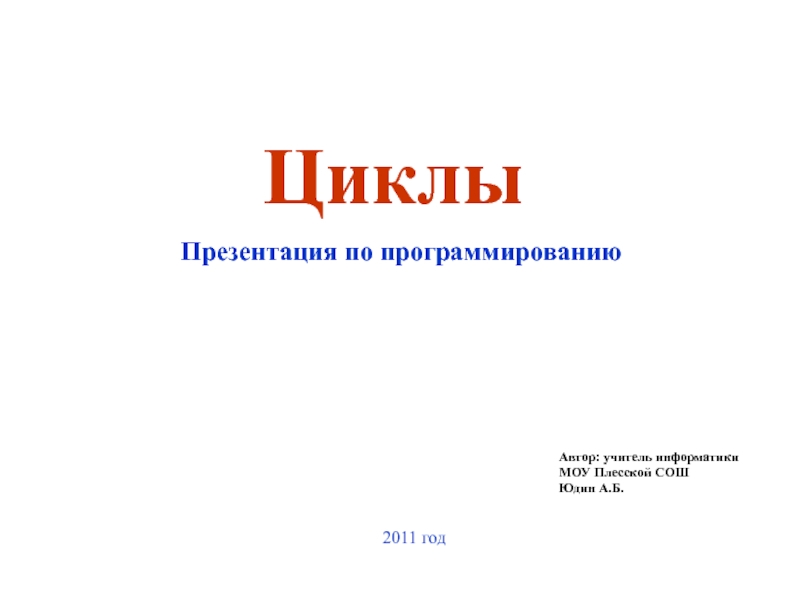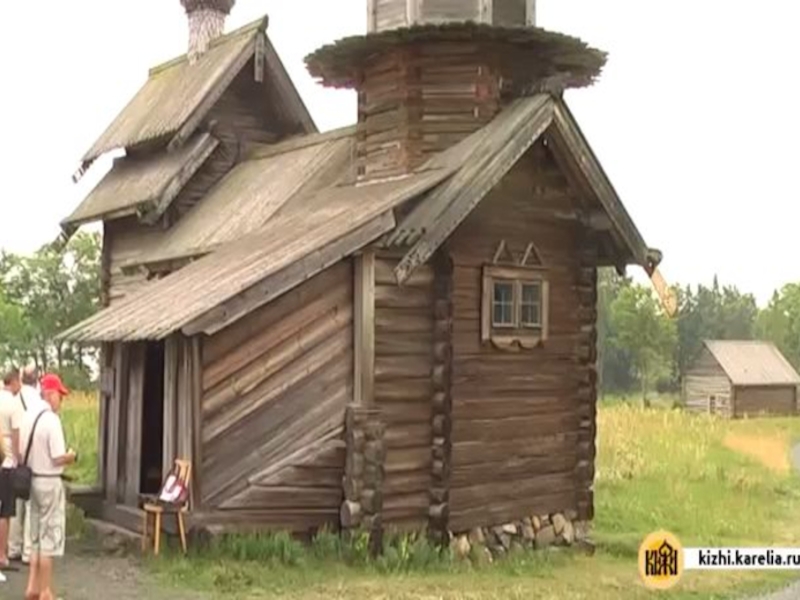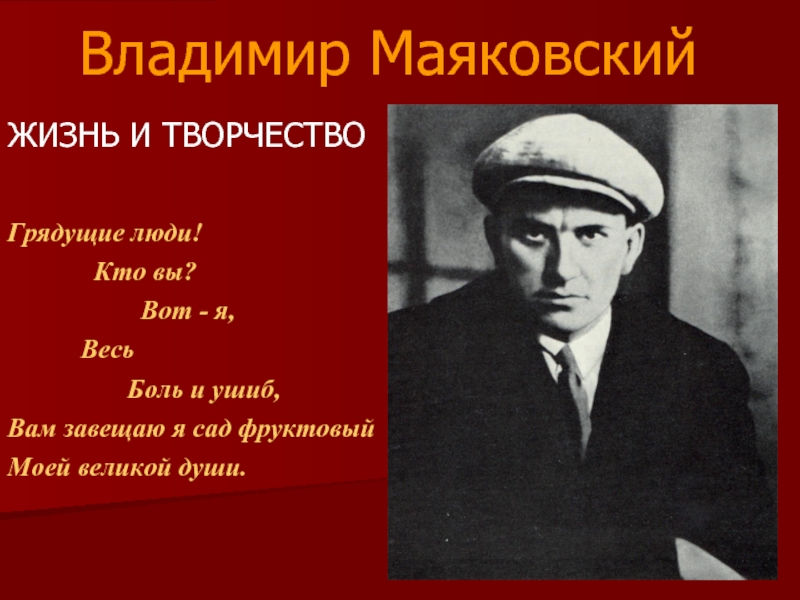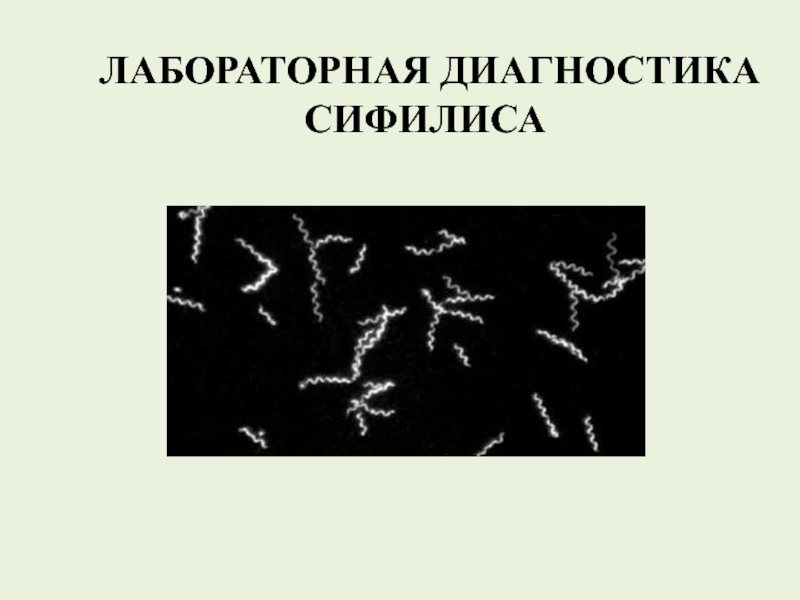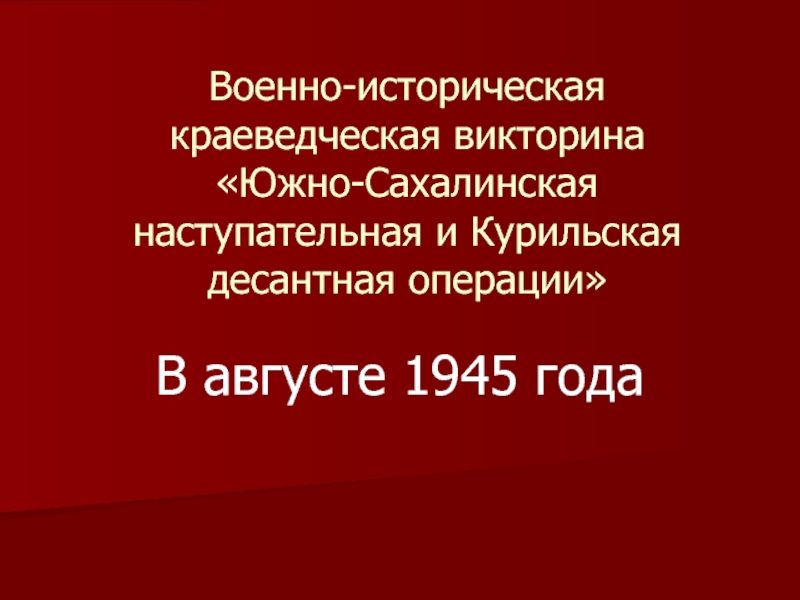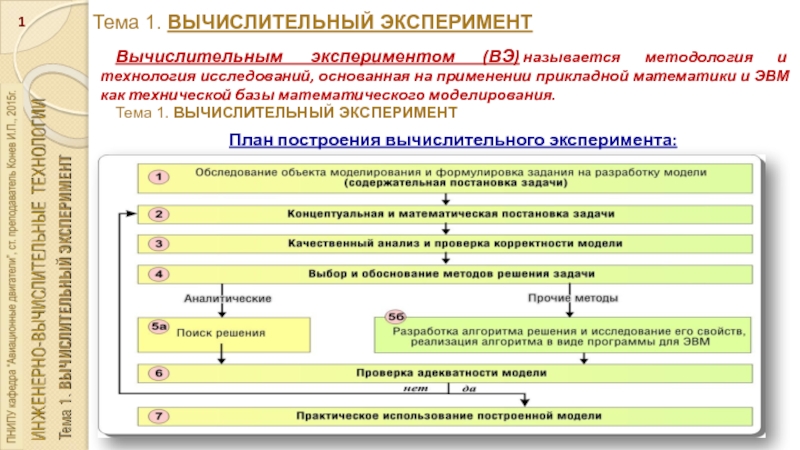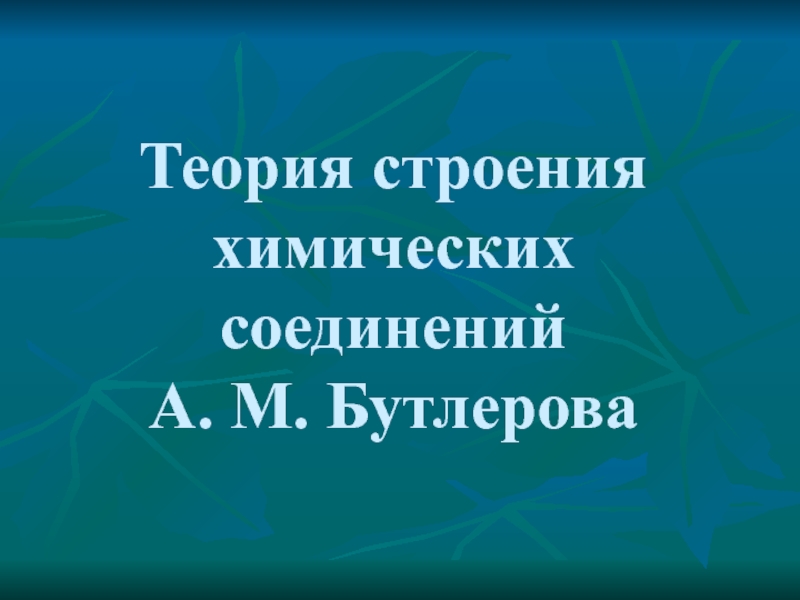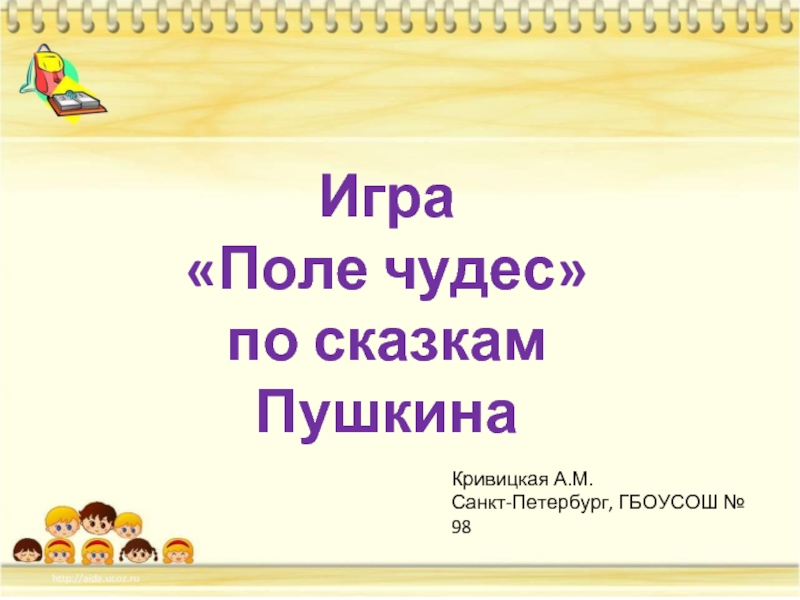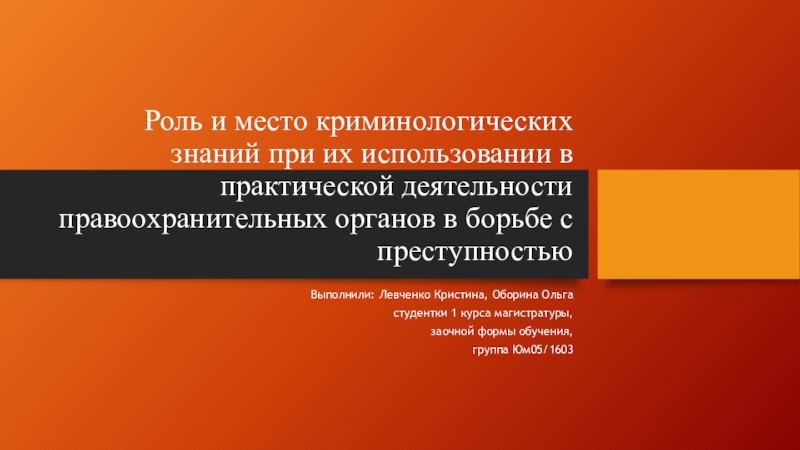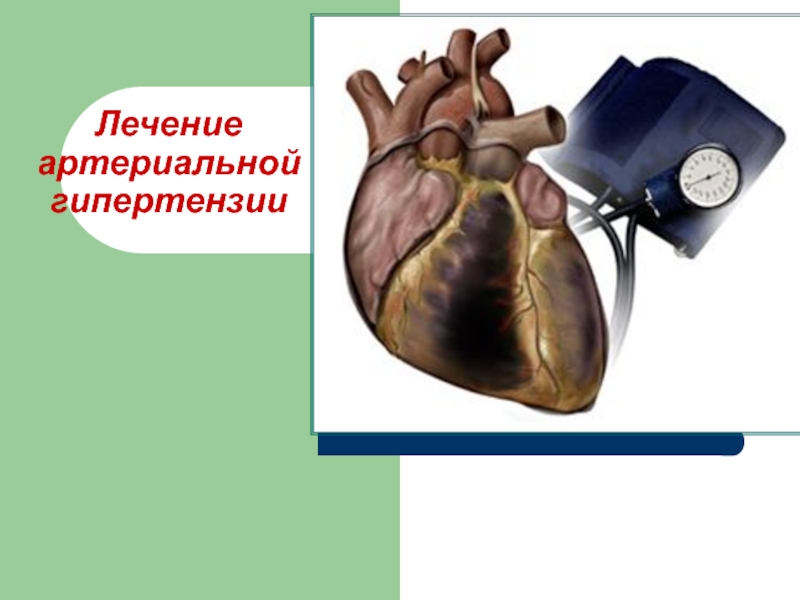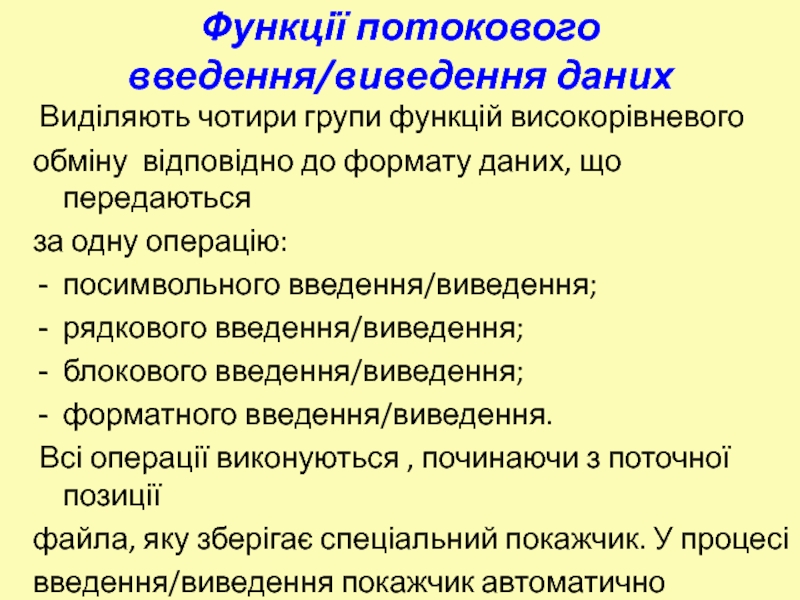Разделы презентаций
- Разное
- Английский язык
- Астрономия
- Алгебра
- Биология
- География
- Геометрия
- Детские презентации
- Информатика
- История
- Литература
- Математика
- Медицина
- Менеджмент
- Музыка
- МХК
- Немецкий язык
- ОБЖ
- Обществознание
- Окружающий мир
- Педагогика
- Русский язык
- Технология
- Физика
- Философия
- Химия
- Шаблоны, картинки для презентаций
- Экология
- Экономика
- Юриспруденция
морфология, артикль
Содержание
- 1. морфология, артикль
- 2. морфологияWe sleep upstairs. We sleep two persons
- 3. Лексема— это обобщенное значение, некая абстракция, или
- 4. морфологияoutcry — to cry outoutcome — to come out income — to come in
- 5. СУЩЕСТВИТЕЛЬНОЕ ОБЩАЯ ХАРАКТЕРИСТИКА СУЩЕСТВИТЕЛЬНЫХ a tom-cat a
- 6. СЕМАНТИЧЕСКИЕ ПОДКЛАССЫ СУЩЕСТВИТЕЛЬНЫХ по типу номинации —
- 7. СЕМАНТИЧЕСКИЕ ПОДКЛАССЫ СУЩЕСТВИТЕЛЬНЫХСуществительные нарицательные далее делятся на
- 8. СЕМАНТИЧЕСКИЕ ПОДКЛАССЫ СУЩЕСТВИТЕЛЬНЫХThere are three Marys in
- 9. СЕМАНТИЧЕСКИЕ ПОДКЛАССЫ СУЩЕСТВИТЕЛЬНЫХNounscommonproper(John, London)count non-count collectivepluralia tantumconcreteanimate
- 10. ГРАММАТИЧЕСКИЕ КАТЕГОРИИ СУЩЕСТВИТЕЛЬНЫХКатегория числа — это грамматическая
- 11. ГРАММАТИЧЕСКИЕ КАТЕГОРИИ СУЩЕСТВИТЕЛЬНЫХNow everything is a question
- 12. ГРАММАТИЧЕСКИЕ КАТЕГОРИИ СУЩЕСТВИТЕЛЬНЫХchild — children
- 13. ГРАММАТИЧЕСКИЕ КАТЕГОРИИ СУЩЕСТВИТЕЛЬНЫХcalf— calves
- 14. ГРАММАТИЧЕСКИЕ КАТЕГОРИИ СУЩЕСТВИТЕЛЬНЫХ
- 15. ГРАММАТИЧЕСКИЕ КАТЕГОРИИ СУЩЕСТВИТЕЛЬНЫХmouth — mouths [ðz] path
- 16. ГРАММАТИЧЕСКИЕ КАТЕГОРИИ СУЩЕСТВИТЕЛЬНЫХautomaton — automata
- 17. ГРАММАТИЧЕСКИЕ КАТЕГОРИИ СУЩЕСТВИТЕЛЬНЫХcactus — cacti (cactuses)focus —
- 18. ГРАММАТИЧЕСКИЕ КАТЕГОРИИ СУЩЕСТВИТЕЛЬНЫХ
- 19. ГРАММАТИЧЕСКИЕ КАТЕГОРИИ СУЩЕСТВИТЕЛЬНЫХpassers-bywasher-womentooth-pickshorsemenmen-of-warmothers-in-lawcommanders-in-chiefaides-de-camplookers-ongoings-onpostmasters-generalpoets-laureatefellow-travellersschool-mastersKnights-TemplarsLords JusticesLords Chancellorsmen-servantswomen-doctorsgentlemen-farmerswomen-clerkswomen-studentsgentlemen-boarderscut-throatspick-pocketsthe under-fivesthe over-fortiesgrown-upsforget-me-notshold-allshandfulsgood-for-nothingscourt-martials
- 20. ГРАММАТИЧЕСКИЕ КАТЕГОРИИ СУЩЕСТВИТЕЛЬНЫХfive pounds, но a five-pound
- 21. ГРАММАТИЧЕСКИЕ КАТЕГОРИИ СУЩЕСТВИТЕЛЬНЫХI. a short innings - ход
- 22. ГРАММАТИЧЕСКИЕ КАТЕГОРИИ СУЩЕСТВИТЕЛЬНЫХII.boots — служащий в отеле,
- 23. ГРАММАТИЧЕСКИЕ КАТЕГОРИИ СУЩЕСТВИТЕЛЬНЫХII.amends, annals, archives, arms, arrears,
- 24. ГРАММАТИЧЕСКИЕ КАТЕГОРИИ СУЩЕСТВИТЕЛЬНЫХII. classics, linguistics, phonetics, stylistics,
- 25. ГРАММАТИЧЕСКИЕ КАТЕГОРИИ СУЩЕСТВИТЕЛЬНЫХII.measles, mumps, rickets, shingles Algiers, Athens, Brussels, Flanders, Marseilles, Naples, Wales
- 26. ГРАММАТИЧЕСКИЕ КАТЕГОРИИ СУЩЕСТВИТЕЛЬНЫХa whisky - рюмка виски
- 27. ГРАММАТИЧЕСКИЕ КАТЕГОРИИ СУЩЕСТВИТЕЛЬНЫХthe waters of the Pacificthe
- 28. ГРАММАТИЧЕСКИЕ КАТЕГОРИИ СУЩЕСТВИТЕЛЬНЫХarmy, band, board, cattle, chorus,
- 29. ГРАММАТИЧЕСКИЕ КАТЕГОРИИ СУЩЕСТВИТЕЛЬНЫХ1) Они могут обозначать нечленимую собирательность,
- 30. ГРАММАТИЧЕСКИЕ КАТЕГОРИИ СУЩЕСТВИТЕЛЬНЫХ2) Они могут обозначать членимую собирательность,
- 31. ГРАММАТИЧЕСКИЕ КАТЕГОРИИ СУЩЕСТВИТЕЛЬНЫХСуществительные множества (nouns of multitude),
- 32. Категория родаactor — actress, host —hostess, tiger—
- 33. Категория родаteacher, writer, artist, pupil, student, cook,
- 34. Категория родаbachelor — spinster, brother — sister,
- 35. Категория родаhe-goat
- 36. Категория падежаПадеж трактуется обычно как категория морфологическая,
- 37. Категория падежаthe inflected genitive, the possessive case
- 38. Категория падежаобщий падеж the common case, не
- 39. Категория падежаthe dog's barking, the lion's tail,
- 40. Категория падежаthe yacht's deck, the ship's wreckage,
- 41. Категория падежаthe tree's branches, the machine's structure,
- 42. Категория падежаAchilles' |e'kili:z] death Theognis' [θi‘ognis] poemÆschylus' [‘iskilas]
- 43. Категория падежаthe general's letter, the country's tradition,
- 44. Категория падежаthe doctor's arrival the doctor
- 45. Категория падежаan hour's delay, a week's holiday,
- 46. Категория детерминации: Артикльнеопределенный артикль a (an) и
- 47. Категория детерминации: Артикльартикли выполняют конкретизирующую функцию, т.е. способствуют достижению однозначности смысла в восприятии реципиента
- 48. Категория детерминации: АртикльНаиболее общим значением неопределенного артикля
- 49. Категория детерминации: АртикльОпределенный артикль the, напротив, предполагает,
- 50. Категория детерминации: Артикльthe sun, the moon, the
- 51. Категория детерминации: Артикльограничительные прилагательные (limiting adjectives)', the
- 52. Категория детерминации: Артикль... the speech to which
- 53. Категория детерминации: АртикльThe tiger is a wild
- 54. Категория детерминации: АртикльКоммуникативная функция артикля — это
- 55. Категория детерминации: АртикльМальчик 'пришел соответствует The boy has come.'Мальчик
- 56. Категория детерминации: АртикльA picture which attracted his
- 57. Категория детерминации: Артикль"Once upon a time, it
- 58. Категория детерминации: Артикль"There lived a king and
- 59. Категория детерминации: Артикльотсутствие артиклямассы, материала (water, sand,
- 60. Категория детерминации: Артикльbetween finger and thumb; from
- 61. Категория детерминации: АртикльНе is man enough to
- 62. Категория детерминации: Артикль1. We know very little about
- 63. Категория детерминации: Артикльа) Оппозиция нулевой артикль —
- 64. Категория детерминации: Артикльб) Оппозиция нулевой артикль —
- 65. Категория детерминации: АртикльShe was woman enough to
- 66. Категория детерминации: Артикльthe blind, the rich, the
- 67. Категория детерминации: АртикльThe sky was a pale
- 68. Категория детерминации: АртикльIn such cases a the
- 69. Категория детерминации: АртикльНе returned home with a
- 70. Категория детерминации: АртикльAren't you the young man
- 71. Категория детерминации: АртикльThe more he reflected on
- 72. Скачать презентанцию
Слайды и текст этой презентации
Слайд 1
План:
Морфология, ее объект и задачи.
Существительное:
Общая характеристика существительных.
Семантические подклассы существительных.
Грамматические категории
существительных:
Слайд 2морфология
We sleep upstairs. We sleep two persons in one room
Не takes his books from the library. It takes a
lot to become a specialist. Не did it naturally. Naturally, he did it.
Слайд 3Лексема
— это обобщенное значение, некая абстракция, или концепт, только имплицирующий
определенные грамматические признаки, которые реализуются в зависимости от синтаксической функции
и окружения.Слайд 5СУЩЕСТВИТЕЛЬНОЕ
ОБЩАЯ ХАРАКТЕРИСТИКА СУЩЕСТВИТЕЛЬНЫХ
a tom-cat
a jenny-goat
a he-parrot
the
baby - he и she
Слайд 6СЕМАНТИЧЕСКИЕ ПОДКЛАССЫ СУЩЕСТВИТЕЛЬНЫХ
по типу номинации — индивидуализирующей
и классифицирующей. Индивидуализирующими являются имена собственные (proper nouns), а классифицирующими,
т.е. причисляющими называемый объект к классу подобных, — нарицательные (common nouns).Слайд 7СЕМАНТИЧЕСКИЕ ПОДКЛАССЫ СУЩЕСТВИТЕЛЬНЫХ
Существительные нарицательные далее делятся на исчисляемые (count nouns)
и неисчисляемые (non-count nouns, or mass and material nouns), в
зависимости от наличия или отсутствия категории числа, а также собирательные существительные (collective nouns).Слайд 8СЕМАНТИЧЕСКИЕ ПОДКЛАССЫ СУЩЕСТВИТЕЛЬНЫХ
There are three Marys in our group',
She is
a Brown — одна из Браунов;
The Browns are now in
their country house.Слайд 9СЕМАНТИЧЕСКИЕ ПОДКЛАССЫ СУЩЕСТВИТЕЛЬНЫХ
Nouns
common
proper
(John, London)
count
non-count
collective
pluralia tantum
concrete
animate
inanimate
abstract
(idea, talent,
opinion)
abstract
(music, courage)
material, mass
(butter, oil, water)
animate
(nouns of multitude)
(family, team)
inanimate
(abstract nouns or singularia tantum)
(money, advice, information, peace, truth)
concrete
(scissors, bowls, billiards)
mass
(oats, grapes, potatoes)
complex indivisible notions
and structures
(stairs, archives, dregs)
Слайд 10ГРАММАТИЧЕСКИЕ КАТЕГОРИИ СУЩЕСТВИТЕЛЬНЫХ
Категория числа — это грамматическая категория, выражающая специальными
морфемами значение единичности/множественности. Она реализуется в соотносимости форм единственного и
множественного числа и расчлененности объектов рассмотрения и наименования.Слайд 11ГРАММАТИЧЕСКИЕ КАТЕГОРИИ СУЩЕСТВИТЕЛЬНЫХ
Now everything is a question and when I
try to answer I keep thinking of buts and howevers
and anyways and on the other sidesСлайд 12ГРАММАТИЧЕСКИЕ КАТЕГОРИИ СУЩЕСТВИТЕЛЬНЫХ
child — children
man — men
ox — oxen
woman — womenbrother — brethren foot — feet
(с изменением mouse — mice
значения: louse — lice
brethren — «братья»
(как члены религиозного
сообщества)
Слайд 13ГРАММАТИЧЕСКИЕ КАТЕГОРИИ СУЩЕСТВИТЕЛЬНЫХ
calf— calves
elf— elves
knife — knives
leaf— leavesshelf — shelves thief — thieves
wife — wives wolf— wolves
life — lives (но still-lifes — loaf — loaves натюрморты)
Слайд 14ГРАММАТИЧЕСКИЕ КАТЕГОРИИ СУЩЕСТВИТЕЛЬНЫХ
hooves
(реже)
rooves (реже)hoof roof
hoofs roofs
scarves wharves
scarf wharf
scarfs (реже) wharfs (реже)
Слайд 15ГРАММАТИЧЕСКИЕ КАТЕГОРИИ СУЩЕСТВИТЕЛЬНЫХ
mouth — mouths [ðz]
path — paths [ðz]
oath — oaths [ðz]
heaths [Os], truths, wreathes, hearths, youths.
Слайд 16ГРАММАТИЧЕСКИЕ КАТЕГОРИИ СУЩЕСТВИТЕЛЬНЫХ
automaton — automata analysis
— analyses bacillus - bacilli
criterion — criteria
axis — axes stimulus — stimuliphenomenon — phenomena basis — bases radius — radii
crisis — crises datum - data
diagnosis — diagnoses
hypothesis — hypotheses
matrix — matrices
neurosis — neuroses
oasis — oases
synthesis — syntheses
Слайд 17ГРАММАТИЧЕСКИЕ КАТЕГОРИИ СУЩЕСТВИТЕЛЬНЫХ
cactus — cacti (cactuses)
focus — foci (focuses)
fungus —
fungi (funguses)
index — indices (indexes)
papyrus — papyri (papyruses)
terminus — termini (terminuses)
curriculum — curricula (curriculums)
memorandum — memoranda (memorandums)
millennium — millennia (millenniums)
spectrum - spectra (spectrums)
stratum — strata (stratums)
Слайд 18ГРАММАТИЧЕСКИЕ КАТЕГОРИИ СУЩЕСТВИТЕЛЬНЫХ
genii (духи-покровители)
Genius
geniuses (гении, таланты в интеллектуальной или артистической сфере)фр.\ tableau — tableaux, adieu — adieux (adieus), beau - beaux
(beaus);
итал/, bandit — banditti.
the two Miss Smiths — the two Misses Smith
the two Master Smiths — the two Masters Smith
the two Mr. Smiths — the two Messrs Smith
Слайд 19ГРАММАТИЧЕСКИЕ КАТЕГОРИИ СУЩЕСТВИТЕЛЬНЫХ
passers-by
washer-women
tooth-picks
horsemen
men-of-war
mothers-in-law
commanders-in-chief
aides-de-camp
lookers-on
goings-on
postmasters-general
poets-laureate
fellow-travellers
school-masters
Knights-Templars
Lords Justices
Lords Chancellors
men-servants
women-doctors
gentlemen-farmers
women-clerks
women-students
gentlemen-boarders
cut-throats
pick-pockets
the under-fives
the over-forties
grown-ups
forget-me-nots
hold-alls
handfuls
good-for-nothings
court-martials
Слайд 20ГРАММАТИЧЕСКИЕ КАТЕГОРИИ СУЩЕСТВИТЕЛЬНЫХ
five pounds, но a five-pound note
ten miles, но
a ten-mile walk
dozens of eggs, но two dozen eggs
Many thousands
were killed, но Six thousand two hundred were killed. Millions perished, но Six million two hundred people perished.
Слайд 21ГРАММАТИЧЕСКИЕ КАТЕГОРИИ СУЩЕСТВИТЕЛЬНЫХ
I.
a short innings - ход в игре (крикет,
бейсбол)
bellows — инструмент для раздувания огня
gallows — виселица
headquarters — штаб
sure
means — верный способa natural zoological gardens — заповедник, состоящий из нескольких секторов
corps — корпус
shambles — бойня, иногда используется в переносном смысле, например:
The plane was a shambles works. — Самолет обладал колоссальной убойной силой.
crossroads — перекресток
lazy-bones — лентяй, букв, с «ленивыми костями»
Слайд 22ГРАММАТИЧЕСКИЕ КАТЕГОРИИ СУЩЕСТВИТЕЛЬНЫХ
II.
boots — служащий в отеле, который чистит обувь
клиентов;
buttons — служащий, носящий ливрею с рядом пуговиц;
guns
— офицер, отвечающий за оружие на корабле; props (property-man) — реквизитор.
Слайд 23ГРАММАТИЧЕСКИЕ КАТЕГОРИИ СУЩЕСТВИТЕЛЬНЫХ
II.
amends, annals, archives, arms, arrears, brains (умственные способности),
blinds, billiards, dominoes, stairs, contents, clothes, checkers или draughts (щахматы),
news, stacks (хранилище различных однородных предметов, например стеллаж в библиотеке), stalls (партер в театре), scissors и др.Слайд 24ГРАММАТИЧЕСКИЕ КАТЕГОРИИ СУЩЕСТВИТЕЛЬНЫХ
II.
classics, linguistics, phonetics, stylistics, acoustics, statistics, mathematics,
physics, mechanics, politics и др.
Arithmetics, algebra, geometry, and trigonometry
are branches of mathematics Mathematics comprises four branches: arithmetics, algebra, geometry, trigonometry
Слайд 25ГРАММАТИЧЕСКИЕ КАТЕГОРИИ СУЩЕСТВИТЕЛЬНЫХ
II.
measles, mumps, rickets, shingles
Algiers, Athens, Brussels, Flanders,
Marseilles, Naples, Wales
Слайд 26ГРАММАТИЧЕСКИЕ КАТЕГОРИИ СУЩЕСТВИТЕЛЬНЫХ
a whisky - рюмка виски
several whiskies -
несколько рюмок виски
three coffees — три чашки кофе
Wines (разные
сорта вина) were imported from several countries.With the brandies (рюмки коньяка) in their hands, they jerked their hands up and drank.
Не worked nights.
It is always hot here summers. (Ср. с русским работать вечерами, не спать ночами.)
Слайд 27ГРАММАТИЧЕСКИЕ КАТЕГОРИИ СУЩЕСТВИТЕЛЬНЫХ
the waters of the Pacific
the sands of Sahara
the
snows of the Arctic
A Daughter of the Snows (название рассказа
Дж. Лондона)Still waters run deep (пословица).
oats («овсяная крупа»), grapes, raisins, strawberries, gooseberries, currants, cabbages, peas, radishes, onions, noodles
Слайд 28ГРАММАТИЧЕСКИЕ КАТЕГОРИИ СУЩЕСТВИТЕЛЬНЫХ
army, band, board, cattle, chorus, cod, clergy, committee,
company, couple, crew, crowd, deer, family, folk, flock, game, gang,
generation, government, group, herd, majority, minority, pair, parliament, party, pike, police, public, salmon, sheep, staff, team, troutСлайд 29ГРАММАТИЧЕСКИЕ КАТЕГОРИИ СУЩЕСТВИТЕЛЬНЫХ
1) Они могут обозначать нечленимую собирательность, т.е. множественность собирательно-совокупную,
недискретную, несчетную, неопределенную; при этом глагол-предикат и заменяющее местоимение употребляются в
единственном числе:The crew of the ship is excellent.
The team was invited to the Olympic games.
The clergy finds way to attract young people to churches.
The new generation: did she want her own girls to be of it? (Galsworthy).
The committee was unanimous. Our family is large.
Слайд 30ГРАММАТИЧЕСКИЕ КАТЕГОРИИ СУЩЕСТВИТЕЛЬНЫХ
2) Они могут обозначать членимую собирательность, т.е. обозначать дискретное
множество, состоящее из отдельных индивидуумов (людей, животных); в этом случае глагол-предикат
употребляется во множественном числе:The crew have taken their usual posts.
The team are training for the Olympic games.
The clergy take their seats.
The new generation are looking for the way out.
The committee were divided in their opinion.
Our family are having dinner now.
Слайд 31ГРАММАТИЧЕСКИЕ КАТЕГОРИИ СУЩЕСТВИТЕЛЬНЫХ
Существительные множества (nouns of multitude), обозначающие диких животных
и рыб, могут употребляться с числительными и словами, обозначающими неопределенную
количественность, сохраняя при этом свою форму единственного числа, например:Не caught three trout and two salmon, and six mackerels.
a few zebra
herds of antelope and giraffe
Наряду с этим они могут употребляться во множественном числе, обозначая разные породы или сорта рыб.
A book on American fresh-water fishes.
family is ...; family are...', families are....
Слайд 32Категория рода
actor — actress,
host —hostess,
tiger— tigress,
poet—poetess,
waiter— waitress,
author — authoress,
emperor — empress,
steward — stewardess,
god
— goddess, duke —duchess,
master — mistress,
lion — lioness,
widower — widow,
hero — heroine,
bridegroom — bride.
Слайд 33Категория рода
teacher, writer, artist, pupil, student, cook, friend, acquaintance, criminal,
doctor, enemy, fool, foreigner, guest, inhabitant, librarian, musician, neighbour, novelist,
parent, person, professor, servant, speakermale nurse, woman-engineer, woman-producer.
Слайд 34Категория рода
bachelor — spinster,
brother — sister,
father — mother,
boy — girl,
man — woman,
king — queen,
monk
— nun, uncle — aunt,
bridegroom — bride,
widower — widow,
landlord — landlady,
hero — heroine
Слайд 35Категория рода
he-goat she-goat
или jenny-goat
male frog
female frogcock-pheasant hen-pheasant
tom-cat pussy-cat
Слайд 36Категория падежа
Падеж трактуется обычно как категория морфологическая, поскольку выражается в
слове, и синтаксическая, поскольку показывает зависимость одних слов от других,
или связаность одних слов с другимиСлайд 37Категория падежа
the inflected genitive,
the possessive case (the 's genitive),
the
periphrastic genitive (the of-genitive,
group-genitive,
double genitive,
descriptive genitive
Слайд 38Категория падежа
общий падеж the common case, не маркированный никакими формальными
признаками, и
родительный падеж the genitive case, или the possessive
case, ‘s или (‘)Слайд 39Категория падежа
the dog's barking, the lion's tail, the tiger's skin,
Tom's books, the Administration's decision, the Government's policy, the company's
capital, the nation's progress, the church's missionСлайд 40Категория падежа
the yacht's deck, the ship's wreckage, the car's wheel
a
student's book, my aunt's house, the country's political status, the
united State's policy, Florida's resorts, Hollywood's studios, London's sights, Oxford's system of educationСлайд 41Категория падежа
the tree's branches, the machine's structure, the river's margin,
the liquid's molecules, the story's end, the union's executive
Wilde's plays,
Dickens's novels, the party's conference, the worker's claim, the world's contempt. a work of Milton's (одна из), a friend of his father's (один из).
Слайд 42Категория падежа
Achilles' |e'kili:z] death
Theognis' [θi‘ognis] poem
Æschylus' [‘iskilas] plays
Zeus' [zju:s] decision
Euripides'
[ju‘ripidi:z] personality
Aeneas' [i:'ni:es] father
Menelaus' [.meni'leias] wife
Lucretius' [l(j)u:'kri:ζes] poem
in Socrates' ['sokrati:z]
lifetimefor Jesus' sake
Слайд 43Категория падежа
the general's letter, the country's tradition, the singer's great
fame, science's influence on our society, duty's call, the book's
true importance, the television's future, the Government's policy, the church's mission.Слайд 44Категория падежа
the doctor's arrival the doctor arrived.
John's arrest
John arrested somebody или John was arrested.
My aunt's murder
My aunt murdered somebody или My aunt was murdered.Tom's accusation Tom accused somebody или Тоm was accused.
Слайд 45Категория падежа
an hour's delay, a week's holiday, today's mail, yesterday's
fashion, a day's work, a moment's thought, the season's first
performance, a mile's cross (кросс на дистанцию в одну милю), а 15 minutes' drive (15-минутная поездка).the earth's rotation, the world's economic progress, the school's history, Europe's countries, the United States' policy, Florida's resorts, Hollywood's studios, London's sights.
under the robin's egg April sky
Слайд 46Категория детерминации: Артикль
неопределенный артикль a (an) и определенный артикль the,
а в некоторых функциях используется триада — a, the и
отсутствие артикля (нулевой артикль — zero article).Слайд 47Категория детерминации: Артикль
артикли выполняют конкретизирующую функцию, т.е. способствуют достижению однозначности
смысла в восприятии реципиента
Слайд 48Категория детерминации: Артикль
Наиболее общим значением неопределенного артикля является импликация чего-то
нового, незнакомого, иногда неожиданного, знание о котором ограничено лишь знакомством
в пределах описываемого временного пространства (один из, любой). Не is a doctor, This is a book; There is an apple-tree in my garden; He is a man from our townСлайд 49Категория детерминации: Артикль
Определенный артикль the, напротив, предполагает, во-первых, информированность адресата
на основе предшествующих обстоятельств или опыта о референте и, во-вторых,
установку на восприятие чего-либо в целостности, единстве, а также выделенности, указательности, индивидуализации.We forgot to discuss it at the time (= at that time); They sold it quickly at the price (= at that price); He meant nothing of the sort (= of that sort).
Слайд 50Категория детерминации: Артикль
the sun,
the moon,
the earth,
the universe,
the tsar,
the king,
the poet Byron,
the great Shakespeare,
the headmaster of our school
Слайд 51Категория детерминации: Артикль
ограничительные прилагательные (limiting adjectives)', the left hand, the
previous page, the absolute limit, the central part
прилагательные в превосходной
степени, имеющие ту же ограничительную значимость: the best performance, the most elegant costume, the brightest actor, the horridest man I have ever seen.Слайд 52Категория детерминации: Артикль
... the speech to which you alluded
... the
matter which you refer to
... the day when you
were born... the reason why I ask about it
Релятивное местоимение может в таких случаях опускаться:
... the boy I looked for ... the book you gave me
Слайд 53Категория детерминации: Артикль
The tiger is a wild animal (т.е. тигр
вообще).
A tiger is a wild animal (т.е. любой тигр).
A cat
is always a cat (любая кошка всегда остается кошкой).Слайд 54Категория детерминации: Артикль
Коммуникативная функция артикля — это способ введения обозначения
референта в коммуникативное пространство либо как уже известного адресату, исходного
в повествовательно-информационном плане, либо как нового, неизвестного, представляемого впервые. Тем самым способы детерминации связываются со степенью информированности адресата о предмете разговора или направленности текстового изложения, а также с этапами процесса осмысления адресатом новой информации.Слайд 55Категория детерминации: Артикль
Мальчик 'пришел соответствует The boy has come.
'Мальчик пришел соответствует A boy has
come.
Пришел 'мальчик соответствует A boy has come.
'Пришел мальчик соответствует The boy has come.
Слайд 56Категория детерминации: Артикль
A picture which attracted his attention on the
wall was only dimly lit by a lamp on the
table.Smoke moved from the river.
Слайд 57Категория детерминации: Артикль
"Once upon a time, it matters little when,
and, in stalwart England, it matters little where, a fierce
battle was fought. It was fought upon a long summer day when the waving grass was green.Many a wild flower formed by the Almighty hand to be a perfumed goblet for the dew, felt its enameled cup filled with blood that day, and shrinking dropped...."
Слайд 58Категория детерминации: Артикль
"There lived a king and a queen. They
had a daughter, a princess. Then the queen died, and
the king took a second wife. The stepmother disliked the princess at once... ."Слайд 59Категория детерминации: Артикль
отсутствие артикля
массы, материала (water, sand, milk, air)
сплошная
материальная, но не дискретная масса, как, например, поле, газон, луг,
покрытые сплошь растениями (grass, flax, clover)обобщенной совокупности (literature, poetry, prose, history, life, age, antiquity, agriculture)‘
совокупность людей в виде государственных, правовых, социальных или религиозных организаций, обществ, партий, воинских подразделений и т.п. (Parliament, Senate, Congress, Government, Headquarters, Divisional Staff)
Значение обобщенной совокупности сохраняется и при наличии определения (English history and literature, life in desert, old age), но может быть разрушено при изменении структуры (the Parliament of today), когда имеется в виду конкретизация или выделение особенностей.
существительные, обозначающие процессы и процедуры, например приема пищи (at lunch; at dinner, tea was over, they have just finished breakfast).
Безартиклевое употребление характерно также для повелительных предложений, особенно военных команд: next please, eyes right, hands up.
Безартиклевое употребление распространяется также на существительные во множественном числе, передающие значения социального статуса или совокупности людей одной профессии, национальности, расы, приверженцев идей или религии и т.п.: nobles, equals, superiors, inferiors, domestics, commercials, Christians, primitives, ancients, contemporaries, liberals, conservatives, democrats, Europeans, Asiatics, Eurasians, Indians, blacks, whites.
Слайд 60Категория детерминации: Артикль
between finger and thumb; from head to foot;
lock, stock, and barrel (полностью готовый); to call a thing
to mind; by way of; in case ofСлайд 61Категория детерминации: Артикль
Не is man enough to stand it (слово
man означает мужчину как концептуально обобщенного носителя таких качеств, как
сила, мужество, выносливость и др.: «Он в достаточной степени мужчина, чтобы вынести это»).Не is the man for the job {the man обозначает единственного или специально намеченного человека, способного выполнить эту работу. Артикль выполняет функцию выделения, выражения единичности в смысле способности к чему-то, адекватности для выполнения какой-то миссии: «Он именно тот человек, который способен выполнить эту работу»).
Не is a man from our town (a man означает «один из многих подобных» — артикль используется в своей классифицирующей функции, выражая отнесенность к классу однотипных сущностей и значение единичности: «Он — парень из нашего города»).
Слайд 62Категория детерминации: Артикль
1. We know very little about prehistoric man.
The garden
seemed untouched by the hand of man. He is more
artist than sculptor. Mankind is a diversity of human species.2. This is the idea I have been trying to formulate. This is the news which may kill her.
This was the end nobody expected.
3. This is an extract from the book. Here is an example of such usage. He is a student of the University
There is a man waiting for you in the hall.
Слайд 63Категория детерминации: Артикль
а) Оппозиция нулевой артикль — неопределенный артикль реализует
дифференциацию материальных и конкретных существительных:
glass — стекло a glass — стакан,
рюмка, барометрiron — железо an iron — утюг
Hercules — a Hercules (необычайно сильный человек).
Shakespeare — a Shakespeare of our time (разносторонне талантливая и глубоко понимающая человеческие проблемы личность).
I was able to quote the play in great chunks with the passion of a Lear.
Just imagine, a Rembrandt of our time!
Слайд 64Категория детерминации: Артикль
б) Оппозиция нулевой артикль — определенный артикль также
значима. Использование определенного артикля с существительными, обозначающими недискретный референт или
референт с нечеткими размытыми границами его объема или объема его значения (water, air, happiness, joy, difficulty), предполагает всегда информированность относительно известной части референта. Например, вода в ведре или чайнике, количественно ограниченная вместимостью этих сосудов, будет по-английски обозначаться the water in the pail, the water in the kettle.The coming reform was already in the air.
It was in the blood probably (здесь слова the air и the blood имеют обобщающее значение, т.е. the air обозначает ситуацию, положение дел, the blood обозначает породу, наследственность)
Слайд 65Категория детерминации: Артикль
She was woman enough to see it. He
is less statesman than actor.
Аналогичного рода номинативное и морфологическое размежевание
происходит в случае слов school, hospital, church и др., которые могут обозначать функционирующие заведения, институты, учреждения, сферы духовной жизни, развлечения и др., и в этом случае они используются без артикля:School begins at nine.
The doctor recommends me to stay in hospital for a month.
Church is not supposed to interfere into state affairs.
НО:
The school is quite near by.
We approached the hospital with a feeling of premonition.
He entered the church.
They took ship to Palermo
Слайд 66Категория детерминации: Артикль
the blind, the rich, the unreal, the invisible,
the unbelievable, the learned
The wounded is well provided with
medicines. The wounded are numerous. The fabulous is always interesting. The fabulous are difficult to believe.Слайд 67Категория детерминации: Артикль
The sky was a pale blue. Her hair
was a bright brown.
Субстантивация возможна и очень типична для словосочетаний:
an
also-ran (один из многих участников гонки).A never-again was prophesied.
Слайд 68Категория детерминации: Артикль
In such cases a the is always required.
It
wasn't a he. He is such a nothing.
The you inside
you gathers up defensively (Christophersen 1939: 78).Примеры из Р. Брэдбери:
"Important thing is not the me that's lying here, but the me that's sitting on the edge of the bed looking back at me, and the me that's downstairs cooking supper or out in the garage under the car, or in the library reading.
And he would be the I whose bed Naomi sat on, whose sleeve I brushed rain off: tender and guardable. He would be the Max I heard talking when I stood outside the salon, the I Max rang up: that other we were both looking for."
Слайд 69Категория детерминации: Артикль
Не returned home with a feeling of having
been betrayed.
He had a very sketchy idea of how a
company was run in the line.It was a women's college.
There is a man offering his services.
Clyde had a soul that was not destined to grow up. She had green eyes and a spattering of what Joseph called American freckles.
Слайд 70Категория детерминации: Артикль
Aren't you the young man who married Fleur
Forsyte?
The fact that Con should possess a motorcar was in
itself a joke.She despised all the pictures he preferred.
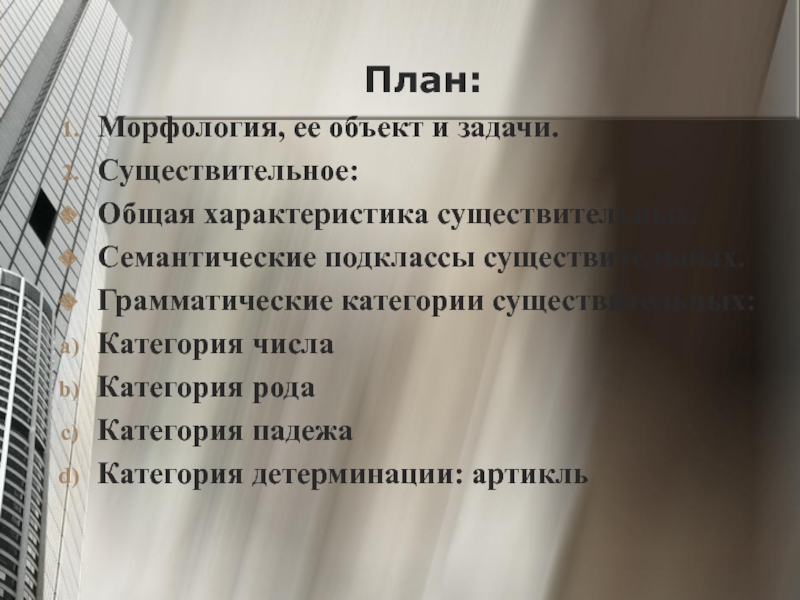
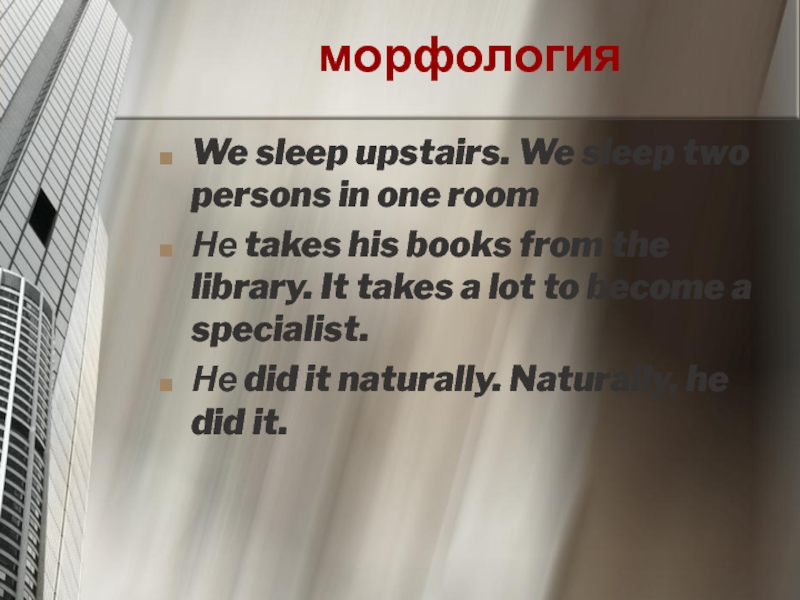

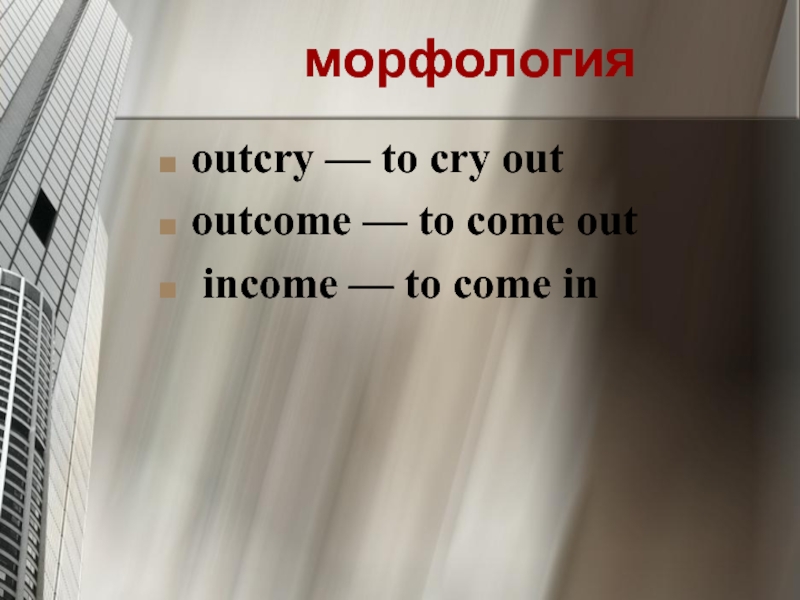


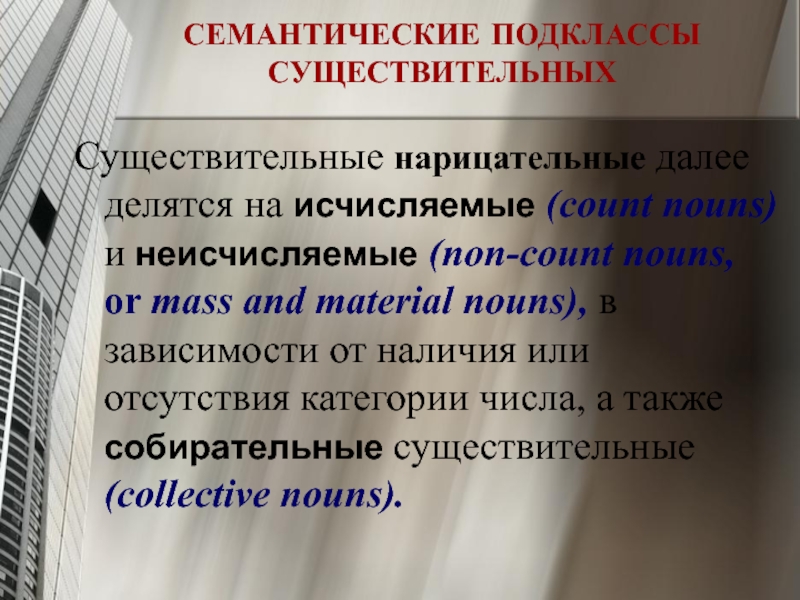
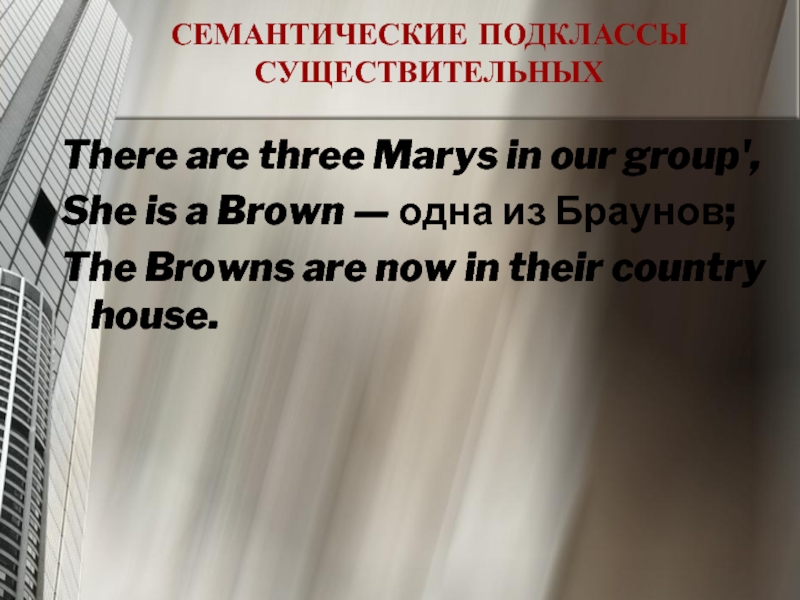



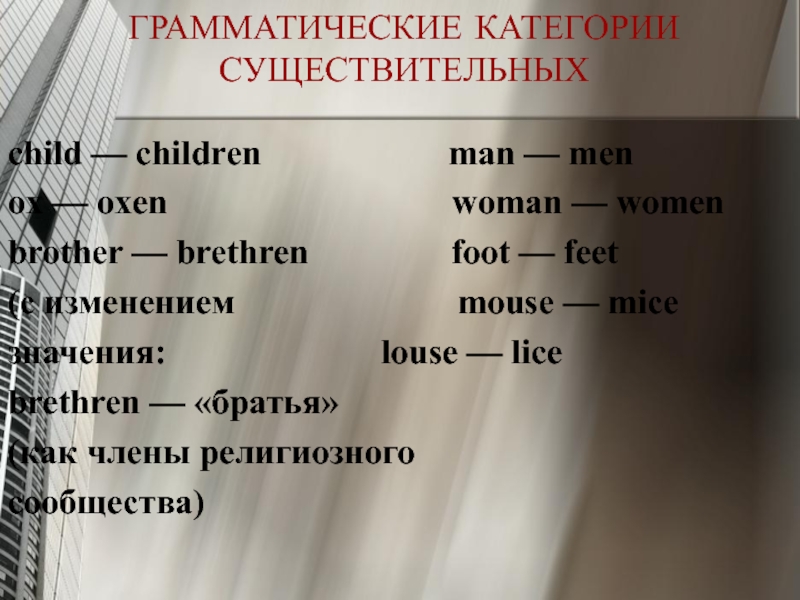


![морфология, артикль ГРАММАТИЧЕСКИЕ КАТЕГОРИИ СУЩЕСТВИТЕЛЬНЫХmouth — mouths [ðz] path — paths [ðz] oath ГРАММАТИЧЕСКИЕ КАТЕГОРИИ СУЩЕСТВИТЕЛЬНЫХmouth — mouths [ðz] path — paths [ðz] oath — oaths [ðz]heaths [Os], truths, wreathes,](/img/thumbs/bcf8b2493a2a1caacbf04a2276de77e0-800x.jpg)



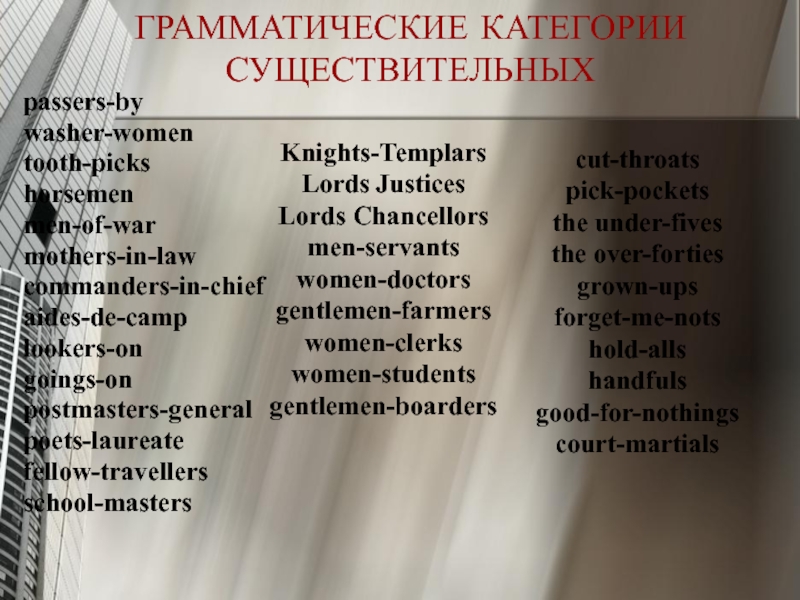

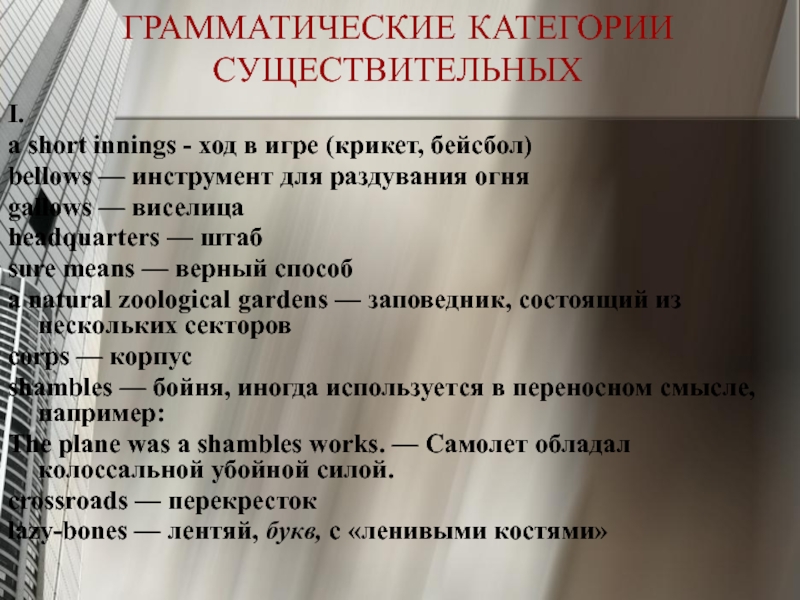



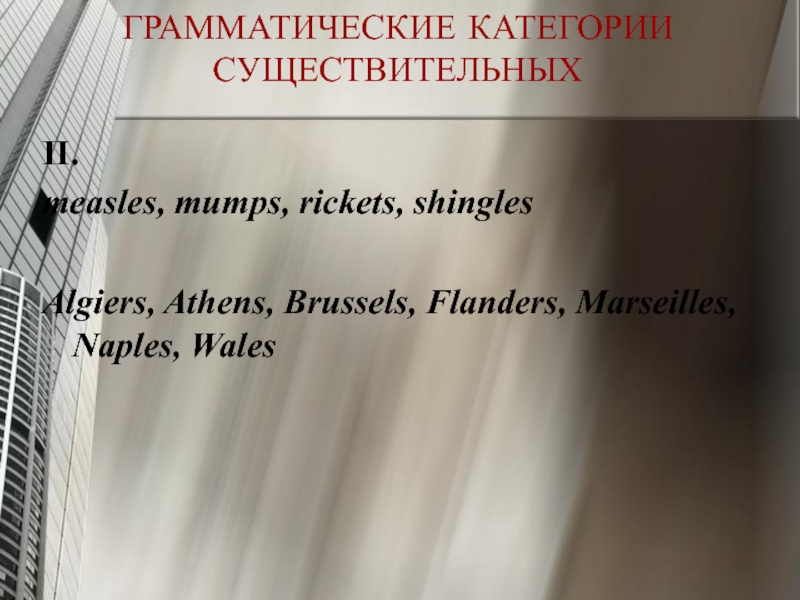


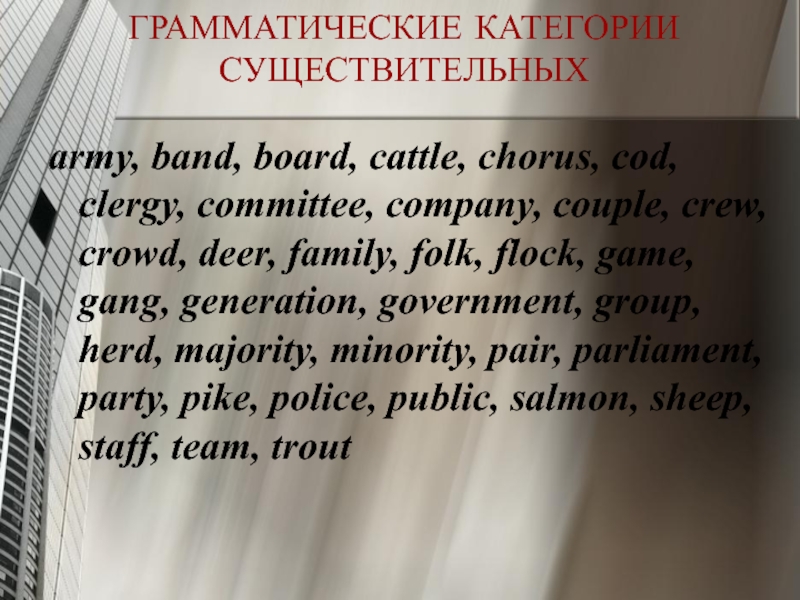

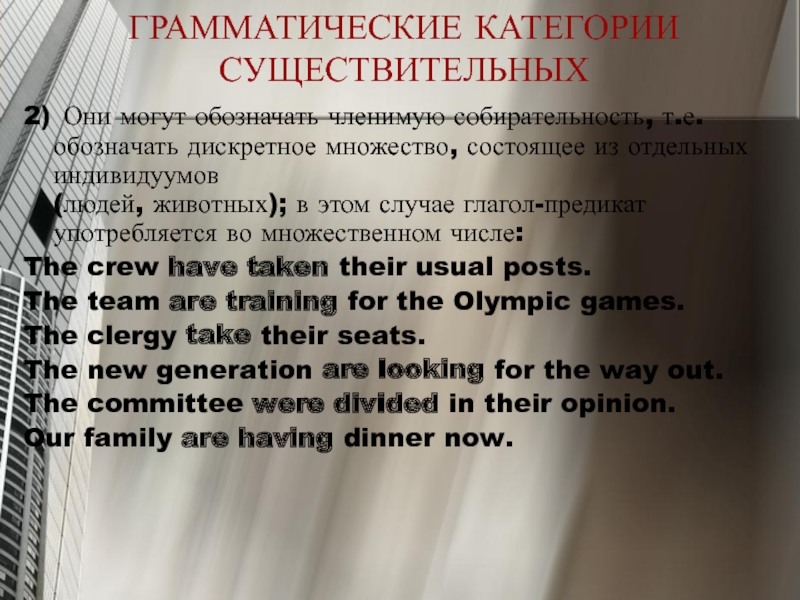

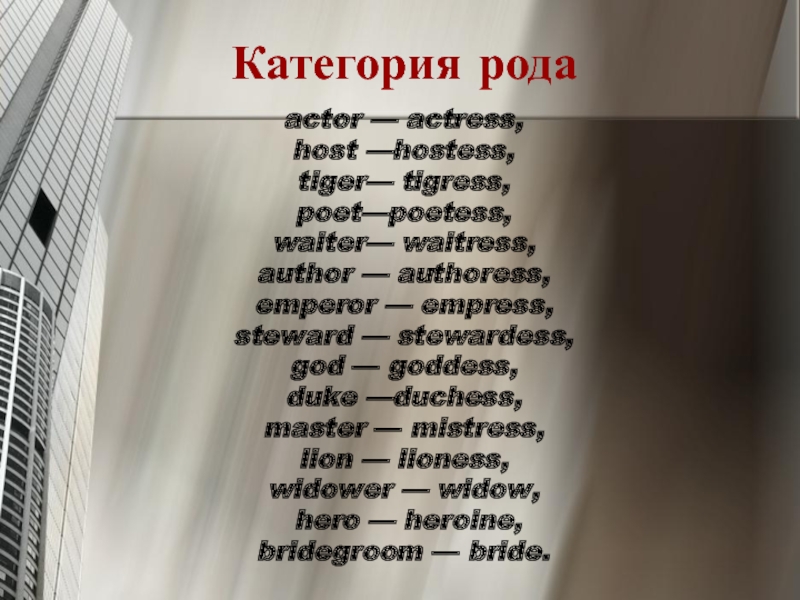
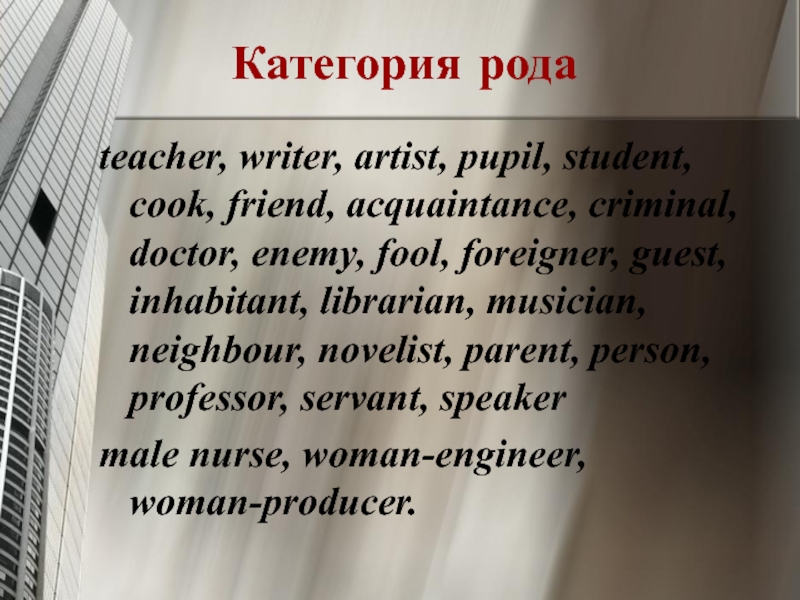
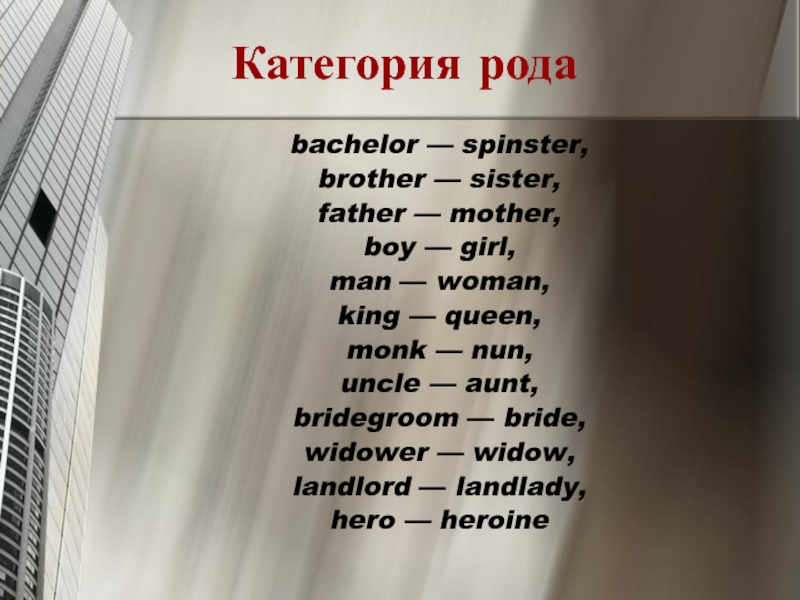
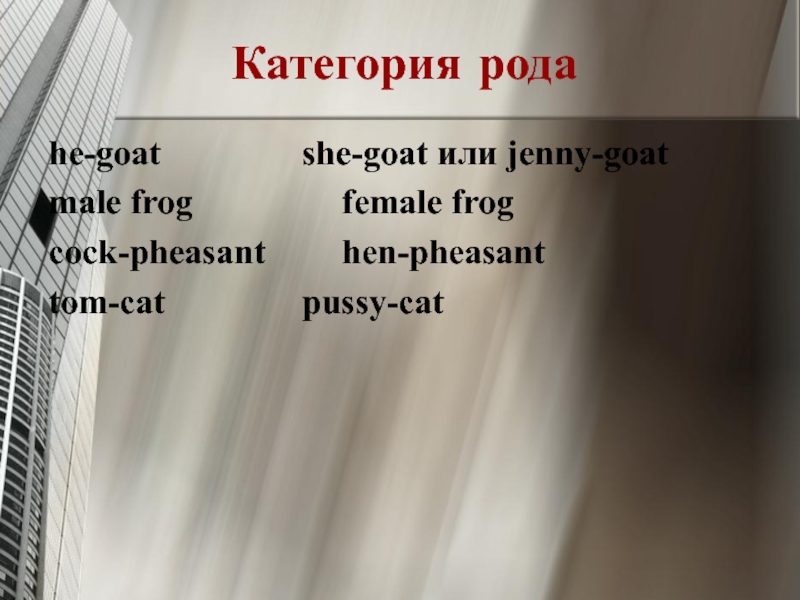
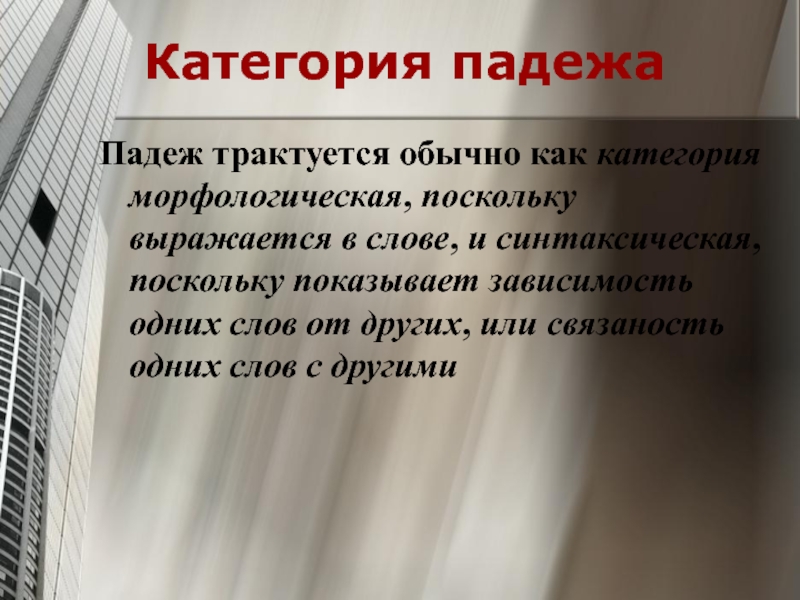

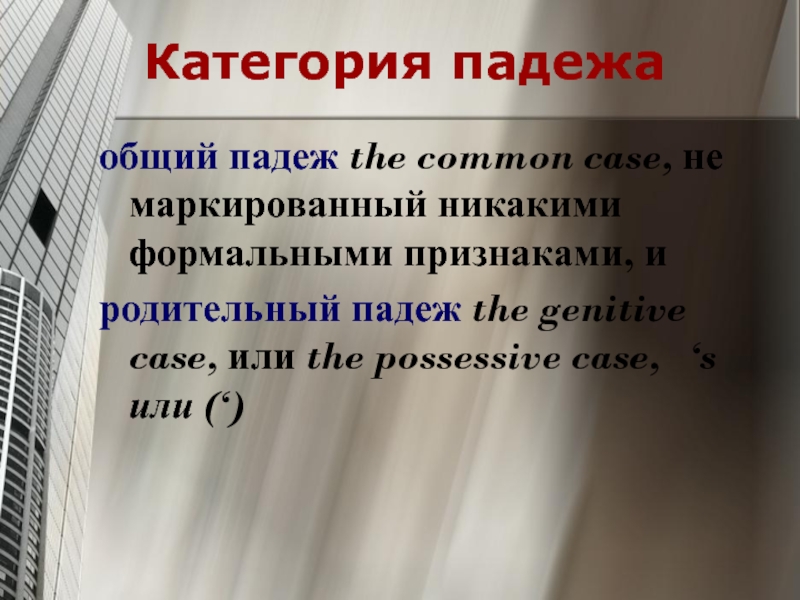
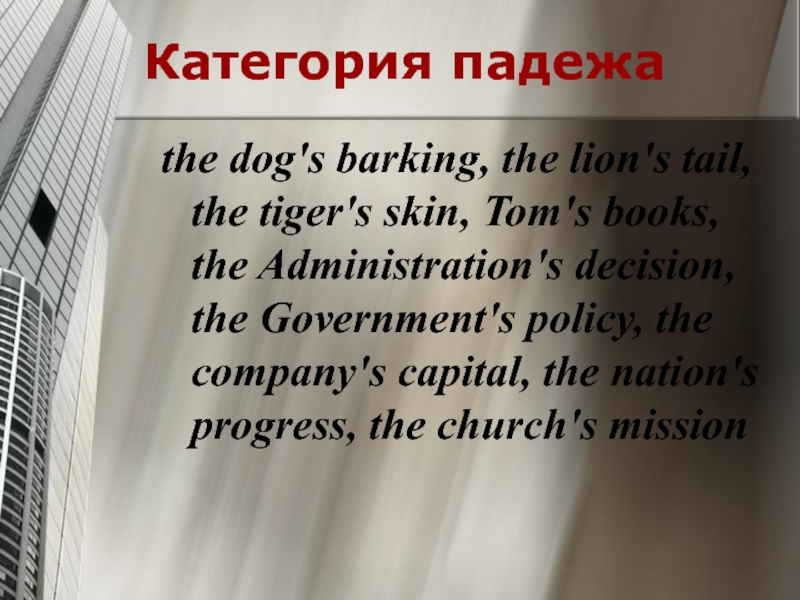


![морфология, артикль Категория падежаAchilles' |e'kili:z] death Theognis' [θi‘ognis] poemÆschylus' [‘iskilas] plays Zeus' [zju:s] decisionEuripides' [ju‘ripidi:z] Категория падежаAchilles' |e'kili:z] death Theognis' [θi‘ognis] poemÆschylus' [‘iskilas] plays Zeus' [zju:s] decisionEuripides' [ju‘ripidi:z] personalityAeneas' [i:'ni:es] fatherMenelaus' [.meni'leias] wife Lucretius' [l(j)u:'kri:ζes]](/img/thumbs/6139c7e71e5031496e80773bb4668b2e-800x.jpg)



